#all the greek gods and goddesses were queer
Text
Stray Kids as Greek mythological figures
Which heroes/ creatures/ gods i think are similar to Stray Kids.
Wc: 470 Genre: AU
Tw: talk of mental health, not proofread
I was thinking of expanding these into full fics, let me know what you think
Bang Chan
Heracles, demigod, son of Zeus and Alcmene. The most famous hero of all Greece and the one most appreciated. His death was commemorated through an official festival. Very strong and brave, I think he suits Channie perfectly. Charismatic just like our leader and very respected and feared.
Lee Know
Hades, god and king of the underworld. Eldest of three sons. just like Lee Know can seem quite cold and scary on the outside but is actually a good person. In myths Hades is never depicted negatively and always preferred to maintain balance. Technically entering the underworld was forbidden for mortals but there are many stories of heroes going back and forth and Hades did not raise a finger and let them be. A scary looking man with a good heart like Lee Know.
Changbin
Atlas, titan of endurance. Punished by Zeus and condemned to hold up the sky for eternity. Really strong and muscly and could probably throw people around like they weighed nothing. Changbin said he bench presses 150kg roughly, which makes him able to lift the average person and I think he could totally hold up the heavens.
Hyunjin
Adonis, human. The most beautiful man in the whole Greece and the blueprint of what a man should have looked like back then. Lover of Aphrodite, the literal goddess of beauty and love. Could pull men and women, which is perfect for Hyunjin because that man is so beautiful inside and out that nobody can resist him.
Han
Alchys, personification of sadness and desperation. I know what you’re thinking about, Han is a very generally bubbly person on the outside but we all know he struggles deeply with mental health and anxiety. As somebody with the same struggles I can say that this fits pretty well. ( I am not saying in any way that he is defined by his struggles)
Felix
Apollo, god of the sun, music, poetry and art. One of the younger gods, a little spicy and definitely queer. Was said to be so bright that looking at him was like looking into the sun. Couldn’t not think of our sunshine Lixie, our shiny baby who is definitely more than a little mischievous.
Seungmin
Thrasos, personification of courage and insolence. Like Seungmin and his sharp tongue, this deity is not afraid to speak even when they shouldn’t. Courageous in a reckless sense, which fits perfectly because I would never dare to back talk Bang Chan when he is mad but I have a hunch that Seungmin would.
Jeongin
Dionysus, god of wine, fruits, insanity and fertility. Very sensual and mischievous, like our maknae lately. Widely appreciated in the whole of Greece, his parties were very alluring and freeing in way. Able to “hypnotize” you with his charisma which explains why everybody loves Innie so much.
#kpop#reader insert#stray kids#stray kids x reader#bang chan#bang chan x reader#lee know#lee know x reader#lee minho#lee minho x reader#changbin#changbin x reader#hyunjin#hyunjin x reader#han#han x reader#han jisung#han jisung x reader#felix#felix x reader#seungmin#seungmin x reader#stray kids headcanon#stray kids headcanons
120 notes
·
View notes
Text
Part 2 of A Gaylor interpretation of "The Prophecy"

I had more Thoughts™ that I initially left out for length, but I'd like to elaborate in sections. Special thanks to @mamataylovesrubbi for being so friendly. This community is so lovely.
TW: Brief talk of self-destructive behavior and suicide near the end.
Part 1 here
Overblown Analysis Under the Cut ↓
Artemis/Diana
Some things about Artemis/Diana that I left out of part one I left out were that 1) Artemis is also the goddess of the hunt and animals. I think that tidbit adds to the fable connection, as fables are often stories about animals. When it comes to the hunt, songs like WAOLOM and The Albotros possibly being about Taylor planning revenge on her closet-ers really scream huntress. Artemis can also become a deer, a somewhat surprisingly non-vicious animal for a huntress, if she pleases. "I've been the Archer / I've been the prey." I think this could portray Taylor's strengths and weaknesses. 2) Artemis is a virginal goddess, never having any male lovers in her stories. This doesn't necessarily make Artemis a sapphic goddess, even though I've seen that interpretation, but it's pretty telling that Taylor would align so closely to a goddess with that trait. 3) Artemis/Diana was also the goddess of the moon (somewhat, it's a bit complicated, but that's Greek mythology for you). Fits the themes of Midnights, with Taylor being Midnight (Rain) and her lover being Sunshine. Though that probably shouldn't be taken too literally, as Apollo, god of the sun, is Artemis's twin brother. Trust him like a brother, yeah—
2. Vocalizing
Taylor's vocalizing after "...tell me it'll be okay" reminds me vaguely of the vocalizing in "My Tears Ricochet", a song, like this album, alludes to Taylor dying.
3. "But I looked to the sky" and "I've been on my knees"
With all the talk of sky, I wonder if maybe "Bigger Than The Whole Sky" might be about failed coming outs. I don't know if this is something others thought have already (probably), but I never thought of it before. Meanwhile, the repeat of being on her knees makes me think of "Would've, Could've, Should've". I've mentioned before that I'm open to that song being actually about JM because it wouldn't surprise me if she tried dating dudes in some way early on in her career, whatever that would mean. However, I'm open to alternatives too. With my analysis of Taylor's Eve being bitten by the serpent/Devil, maybe the serpent could be the Devil from "Would've, Could've, Should've". Maybe the Devil could be The Professor from my "The Manuscript" analysis. I'm leaning toward that Devil being her old label.
4. Throttle
A throttle is several things. It can be something to give machinery fuel. It can be a verb, you can throttle something, aka kill it by strangulation. By "hand on the throttle," I think Taylor was saying she was ready to not only fuel/validate her truth, but kill her past lives. I get this vibe that TTPD might be for TS12 what Reputation was for Lover. Just like with Rep, she's killing the old Taylor(s) that hid her queerness before she steps into the daylight with what comes after. Makes me understand all the chockers and high-neck collars she's been sporting for this era.
5. "And it was written"
I feel like I grazed over this part of the line a bit. What was written? It could be Taylor's lyrics or her 100 thrown-out speeches. She wrote them, but wasn't heard anyway, cursed. Or it could be the word written in the Bible. (In my opinion, shit) translations of the Bible call for all kinds of things to happen to queer people, and has so for years. Not that many though because the word homosexual didn't even exist when the Bible was first scribed. Taylor was cursed before she was even born. Possibly like Eve. Didn't Eve have control over whether she ate the fruit or not? Do queer people have control in who they love? Christian will debate forever.
6. "Let it once be me"
One reason why Taylor wasn't out from the get-go obviously has to do with where her career began and under what industry she was entering. An underaged, famous, sapphic country singer sounds a bit wild now honestly, imagine in 2006! The world would not have been ready, unfortunately. But why can't Taylor come out now? Well, in "WAOLOM", Taylor sneers, "I am what I am 'cause you trained me". She was raised to closet for her whole career, maybe even longer, who could know? And of course, "Old habits die screaming" (from "The Black Dog"). After this album, however, I feel like she's gearing up to free herself. Still, there are so many people younger than Taylor who come out super casually, like Reneé Rapp, Girl in Red, etc, without games or clear fear. Taylor probably sees them and wonders why she couldn't have/had that freedom. Maybe when she says specifically, "redo the prophecy" rather than "change the prophecy" she wishes she could go back in time and somehow make it so she could've come onto the scene out and proud way back then.
7. "like fools in a fable / Oh, it was sinking in"
I think Taylor started feeling like she'd never be free as she began to write Folklore. Of course, she knew the plan didn't work before that in 2019, but as she created Folklore and Evermore, she realized she was anywhere near where she wanted to be in 2020, playing the same games. It sunk in with that. That's why Folklore, Evermore, and even some Midnights songs can sound so hopeless. As an LSK, I don't believe it was due to a breakup, but more closeting. All the albums after Lover seem to have minimal color because she can't be herself.
8. "My last coin"
So, I mentioned in part one that Taylor had/has referenced self-inflicting harmful actions towards herself in many songs. She also mentions poison in this song. It got me thinking about Romeo and Juliet and how that play goes. Taylor, with the "Poison blood from the wound of the pricked hand" seems to be combining Romeo and Juliet's death, Juliet getting stabbed or "pricked" and Romeo drinking poison. Maybe this symbolizes that, even though when she was younger, more naïve and optimistic, she exclusively identified with Juliet and changed her ending in "Love Story", now she identifies with both Romeo and Juliet, even sometimes taking on the "male" role in her songs (e.g. The Heartbreak Prince and JaMEs). A part of me wonders if that could be a comment on her gender identity too, but that goes a bit over my skill level to analyze. But it feels sad that Taylor used to change the fates of Romeo and Juliet and now she's honest about what happens to them. As I said before, I want nothing but good for Taylor. it will be okay. 🤍 ✌️🌈
Alrighty, I think I got it all out of me. Watch me think of some more shit with this song. 🙄😅
#taylor swift#the prophecy#gaylor#the tortured poets department#gaylor swift#friend of dorothea#lgbetty#gaylor theory
29 notes
·
View notes
Text
The Gods' myths sometimes include horrific or immoral aspects. That doesn't mean we should behave as if those myths dont exist!
(A Pagan perspective)

(tw: sa, misogyny)
When we are faced with myths that no longer fit in modern moral views (such as so much SA in Greek mythology alone there's a whole Wikipedia page on it) we should not shy away! Even if we don't like or approve of it, it's a part of the Gods' history and mythos.
All mythology is written by humans, and as such is unavoidably a product of its time. The way that anyone (including modern pagans) interprets the Gods as entities, or any interaction with them, is limited within our own culture, time period, and personal beliefs. By examining both the beliefs of the present and the past, we can decide for ourselves how we see the Gods while considering the context their myths were written in.
Even within one time period or similar group of people, such as modern pagans today, interpretations of the Gods can vary widely.
Zues is a cheating rapist. He is also a powerful god of the skies, lightning, and order.
Lucifer is literally the devil. An evil liar full of sins. And yet he is enlightening, independent, and honest.
Freyja is constantly associated (some say reduced) to sex. She uses her body for her gain, and is quite canonically called a slut. At the same time, she's the goddess of women! Of female power, both in mental skill and physical strength. She leads the Valkyries.
Loki is dark and deceptive, bringer of Ragnarok-- and he's a deity of change and freedom.
And neither is wrong. In mythology, both are true.
The Gods, all their aspects, and all the texts we have of them are complicated, complex, multifaceted, and interpretive- of course, there will be various understandings within pagan practices. No one view is superior to the other. Our understandings all exist on a scale, or rather some sort of mashup, of how important and what importance we attribute to various myths and aspects of deities.
When I worshipped Hera, I did so in two 'versions'. 1. Hera as resistance against men and abuse. I found solace and connection with her in powerful womanhood and female rage. I prayed to her before attending a pro-choice rally. And 2. Hera as a symbol of deep love, power, and marriage, and commitment. I lit her candle when my partner was over or when I needed a confidence boost.
These aspects never felt conflicting to me. Separate, maybe (I certainly wasn't thinking of any cheating or abuse in mythology as overlapping with the love and commitment)- but just part of one THING. Of Hera and everything surrounding her.
To many other deities of various 'immoral' aspects, these conflicting elements aren't just both present but often integral to their presence and worship.
Lucifer is often worshipped in rebellion. In healing from oppressive Christianity and finding light and understanding in that darkness.
Freyja is sexual! One of her many aspects. (which by the way, should not be seen as immoral. looking at yall, bs tumblr feminists) There is pleasure, joy, and power to be found in reclaiming that part of women we are told is shameful.
Loki is so much at once. He is outcast and destructive, and within that he spurs necessary change and chaos. So many pagans look to her as a symbol of queerness in the broadest sense and in facing the necessary chaos of growth.
TLDR: Don't just ignore aspects of mythology that feel uncomfortable (obviously unless something like trauma is involved). There is a lot to learn both from understanding the time and context their myths were written in as well as self-reflection on how certain myths or aspects of deities fit (or don't fit) within your practice.
#pagan#deites#paganism#deities#deitywork#norse paganism#deity work#paganblr#polytheist#hellenic polytheism#heathenry#the old gods#pagan witch#mythology#witch
53 notes
·
View notes
Text
Sorry for the extended hiatus! I am back and ready to share more of my study and worship practices. I also have an email address now, where you can contact me with any in depth questions you might have, or if you want any kind of help or guidance - [email protected]
With that said, who here worships who, and how did you find this path? I’ll go first:
I am somewhat unique in that I only worship one god in the entire Greek pantheon despite believing in the existence of all of them. For this reason I call myself a Hellenic pagan as opposed to a Hellenic polytheist.
I found this path after years of attempting to find solace in the gods. I tried the abrahamic god of Christianity first. I then leant toward the Greek gods, especially Apollo, but was put off after reading a rant by a Greek person about the disrespect and fetishisation foreigners bring to the practice. I decided to heed his advice and worship the gods of my own lineage. This is when I began to pray to the Irish goddess of death and prophecy - The Morrigan. She was far too dark and gritty of a goddess for me at this time. I was in need of nurturing and love, and she was, and is always, in need of soldiers. I am no warrior or soldier. I am tender hearted and thin skinned.
But most of all I was severely sexually repressed due to my undiagnosed gender dysphoria. The Morrigan is a goddess of dark sexuality, and not a deity someone as inexperienced as myself should have attempted to build a connection with. Worship is one thing, but the two way communication I sought in the gods was not able to be fulfilled by her. It was, but just the once. I made a promise to her to stop harming myself and I felt her put armour on my body. I failed to keep my promise. She didn’t take revenge on me for breaking my promise, but I never felt her presence again. I was not ready for her, and she knew it. I felt a sense of pity from her almost. Despite this, her ravens continued to watch over me for quite some time. Even my mother noted there were ravens everywhere when I was around in those days. I was stupid and inexperienced and suffering, and though she knew I wasn’t ready to be her devotee, she never harmed me. For that I am eternally grateful, as her wrath is often deadly.
I sat with the emptiness I felt in myself for quite some time. I remembered back to my early interest in the Greek pantheon, and how I had always felt drawn to Dionysus. Despite my lack of Hellenic heritage, he was a perfect fit for me - this god of queerness, sexual liberation, freedom and insanity was exactly who I needed for guidance in growing up. My first sexual experience was with Dionysus. I don’t really tell people this, because it sounds insane, blasphemous and self centred, but I know what I felt and it isn’t something I can really explain. Through Dionysus I have become so much more comfortable in my body, my sexuality and myself. I went from someone whose own mother referred to them as ‘prudish’ to a confident young man who was happy to flaunt his femininity and sexuality and speak up about his needs.
I have neglected my worship of Dionysus for quite some time. I have been really struggling and busy looking after my burnt out partner along with trying to take care of myself. But Dionysus has quietly been there for me in ways that aren’t always apparent. I feel his love for me. He wears many faces - a father figure, a brother, a best friend, a lover, a mentor, a king, a god. He has been all these things to me throughout my time with him.
So, my friends and followers of the ancient gods - how did you find your faith? And more importantly, how did you keep it?
#dionysus#hellenic polythiest#hellenic pagan#bacchus#witch#witchcraft#greek gods#paganism#helpol#hellenic gods#pagan faith
27 notes
·
View notes
Text
for a final in my anthropology course, we could write a publishable piece and can post it anywhere! i thought this would fit my tumblr pretty well!
QUEER COMFORT AND DISCOMFORT IN RICK RIORDAN’S WRITING UNIVERSE
Rick Riordan’s writing universe is gigantic and diverse in a multitude of ways. In total, there are just around 30 books that he has written for this universe. He has been anointed as the writer of gods by many people. Riordan’s main theme that he writes around is using the idea that all these ‘dead’ religions may have just evolved and that every single one may exist in our world at once. He writes about children of the gods, called many different names, and their adventures to save the world and to save themselves. His most famous series is the Percy Jackson series, using the Greek Mythology religion to write around. Percy is a child of Posidon who meets Annabeth, child of Athena, and a satyr named Grover. These three go on many different adventures to save the world and eventually end up saving the entire country with a war against the old Titans to replace the Gods. While this series is action filled and based around a couple kids, we get to see the incredible diversity that Riordan has written for us. Within this diversity is my main topic of this paper. One demographic that he has included are queer people. Within this universe, there are a large handful of main characters that do end up in this demographic. While it is a cheery thought, Riordan keeps it real by including the modern comfort and discomfort in his universe.
QUEERNESS IN THE UNIVERSE AS A WHOLE
As a whole, queer people in this universe are in the open. Riordan runs with the ideas that some of these different gods may be queer in some capacity, either in myths or in modern retellings. A prime example of this is the god of music and medicine, Apollo. In original Greek myths, he is known to have both female and male lovers. This is true in the books as well. His sister, Artemis, and Athena are known as ‘virgin goddesses’. In more modern terms, a lot of people recognize that they are closer to asexual, not being interested in sex. All of these are included in the books as one off mentions or as common knowledge that most of the people know.
COMFORT: A HOME FOR ALL IDENTITIES
Writing about queer relationships can be really difficult when you are not queer yourself, such as Riordan. For quite some time, he had little to no help in writing these relationships since they didn’t center around them. He knew the books surrounded different characters and them having relationships, queer or not, were not the main focal point for most of the books. One that he had written more solo is Alex Fierro. They are one of the main characters in the Magnus Chase series, following the children of norse gods and using norse mythology. Alex is the child of Loki, who is known for their shapeshifting and trickery features. Alex is genderfluid and transgender, and makes this very clear when people are questioning them. In The Hammer of Thor, Alex is a determined character that explains their gender identity in many forms including saying, “Call me she- unless and until I call you otherwise.” (Riordan 2016: 64). Later she says that “I’m gender fluid and transgender, idiot. Look it up if you need to, but it’s not my job to educate-“ (Riordan 2016: 70). Their pronouns will shift along days or hours. Many genderfluid readers have come forward to say that this character is a positive portrayal of their gender identity. Is it perfect? Of course not. Rick Riordan is a white, straight man in his mid thirties. Yet, readers do appreciate the accuracy and seemingly well done research into this queer identity when it was written to allow such a positive and welcoming portrayal.
This sense of comfort and belonging that Alex had brought for readers didn’t stop at just their gender and how they talked about it. In Ship of the Dead, Alex is currently identifying as a male. When going to Magnus’s, the main character's, apartment, they share one of their first kisses together. Magnus started to question his sexual identity, confused on what this makes him. He realizes that Alex is a bit more important than that and drops it. This gave a huge sense of love in the community. Not only was this a great portrayal of not knowing what you identify as and how that doesn’t really matter in the end, this was the first queer kiss that we read about in this universe. Readers loved this moment and still cherish it amongst the sweetest moments of the universe.
DISCOMFORT: THE MODERN ISSUES THAT WE CAN RELATE TO
Many readers will argue that the most popular queer couple that we have in this universe is Nico Di Angelo and Will Solace. This is due to the fact that Nico was a main character for a while and was well loved and we get a lot of content from their relationship. They are announced to be dating in Blood of Olympus, the last book of the Heroes of Olympus series. At the end of the book, they are all back at their summer camp. Nico realizes that this is a perfect time to ‘clear the air’ since they would be around each other much more often at this point. Nico finally speaks up to say, “For a long time,’ Nico said, ‘I had a crush on you. I just wanted you to know.’ Percy looked at Nico. Then at Annabeth, as if to check that he’d heard correctly. Then back at Nico. …‘But it’s cool. We’re cool. I mean, I see now … you’re cute, but you’re not my type.’...See you around, Percy,’ Nico said…Then he walked back across the green, where Will Solace was waiting.” (Riordan 2014: 488). This very heavily implied that Will and Nico were an official couple.
Nico hasn’t had the best run in this series. He has been through a lot; losing his sister, being a child of one of the most powerful gods in their myths, coming to terms of himself and who he is, and so much more. Riordan uses Nico as a storytelling device to talk about modern issues and pressures of being a young gay man. In House of Hades, Nico and Jason are attempting to reason with Cupid to get a scepter to help their friends. Cupid doesn’t give it up until Nico finally admits that he had a crush on Percy. Nico had been trapped in a time stopping place called the Lotus Hotel and, to make things simple and not have this take a page to write, he had been there since the 1940s. He has been out of there for some time and now is steadily aging as if nothing happened. However, he grew up with horrible ideas about being gay and felt as if he really had to hide it. When Cupid finally gives them the scepter, Jason explains that no one would judge him if he came out to the rest of the group but it was ultimately up to him. This is a huge heartwarming moment. With an incredibly dark moment of real modern issues of being gay and the stigma, we find comfort from Jason. Riordan may not have meant it to mean as big as we think, but Nico is a portrayal of how hard it can be to be queer in this world and how we even struggle to accept ourselves.
This isn’t the last we see of Nico and his boyfriend though. Riordan knew that readers loved this couple and wanted to see more of them. However, he doesn’t have the experience that he wanted to write this couple organically and accurately. And so, he had found a coauthor to help him with this journey. Mark Oshiro (they/them) has written books such as Anger is a Gift and Each of Us A Desert. They do a lot of book reviews as well on their blogs and social media. Oshiro is a queer and latinex author who gave Riordan a new experience to write with and another point of view to help him write this young queer couple. To write about this book would take me ages, especially with every idea that is explored and how much they both cover. Throughout this book, Nico finds himself frustrated with his boyfriend. Nico finds the underworld delightful, familiar, and comfortable. But his boyfriend, a son of Apollo, finds it frightening and disheartening. This theme is touched on throughout the entire book and gives them both many reasons to feel disheartened by the quest. They have arguments about small things, Nico feeling like he doesn’t have the ability to be happy and Will feeling like he has to walk on eggshells. While this theme isn’t inherently just a queer problem, showing that they also have the same issues as many other teenage relationships helps people from thinking of queer couples as the ‘other’ and not like themselves.
While there aren't a lot of main queer characters talked about Rick Riordan’s writing universe, the ones that are there, are quite well written. Riordan has written using tropes but then flipping them right on their head. While they aren't perfect, like anything ever could be, they are well written. He talks about modern issues, allowing the reader to feel the discomfort and then showing comfort for them. He gives them a place to exist in his universe yet doesn’t make it their whole personality. Alex is much bigger than being genderfluid. Nico is much bigger than just being gay. Will is much bigger than being bisexual. They have character arcs and other personality traits that make them more 3-D. People matter more than their sexuality.
Works Cited
Riordan, R., 2016. Magnus Chase and the Gods of Asgard: The Hammer of Thor. New York: Disney Hyperion.
Riordan, R., 2012. Heroes Of Olympus: House of Hades. New York: Disney Hyperion.
Riordan, R., 2023. The Sun and the Star. New York: Disney Hyperion.
Riordan, Rick, Author. The blood of Olympus. [Los Angeles ; New York: Disney-Hyperion, 2014]
“The Sun and the Star: Rick Riordan.” Rick Riordan | Welcome to the Online World of Rick Riordan, 28 Sept. 2022, rickriordan.com/book/the-sun-and-the-star/.
10 notes
·
View notes
Note
Hi, I'm a multigender trans intersex person (bigender transmascfem androgyne, sometimes agender) and I've been feeling a calling towards some kind of occult / pagan / witchcraft practice but am having a very hard time finding anything that will honor both my multigenderness and my intersex body/variation. I was wondering if you knew of any resources or specific practices that might be accepting of this? I had a friend tell me to try out Wicca but it seemed to be very binary-focused in everything I read. Thank you so much for your time!
Wicca is definitely pretty binary focused. Its also diverse and there are many different ways of practicing Wicca, but the fundamental theology is based in a strict binary of the Mother Goddess and the Horned God, and a lot of its beliefs are based on this balance of male/female. As a result much of early Wicca (and some modern Wicca) was very homophobic & gender-sex essentialist (there's also Dianic Wicca, which is goddess-centric and therefore very popular with TERFs). There are trans Wiccans & Wiccan paths which are less binary (or less strict about it), but I wouldn't blame you for not wanting to engage with it.
With Witchcraft, there's a lot more room because "witchcraft" itself isn't its own spiritual tradition as much as a practice or skill you can engage in. In a very general sense Witchcraft is "doing x thing to get y result (through some spiritual/supernatural/mystical method)," so how much you get into cissexism and binary thinking is really dependent on how you see things. For example, a Wiccan might have a very binary view of magic & spiritual energy, but another person might not consider gender at all when doing magic.
A lot of European & WANA (West Asia North Africa) polytheism has some genderfuckery somehwere in its mythology. Inanna/Ishtar in Sumerian/Akkadian/Assyrian polytheism is one example: you might be aware that She had transfeminine devotees called the gala, and she was described as having the ability to "turn a man into a woman and a woman into a man." She has a myth where she descends into the Underworld to confront her sister Ereškigal and gets trapped there. To get her out, Enlil/Ea creates either two sexless beings (gala-tura and kur-jara), or one androgynous being/eunuch (Asušunamir) to save her.
There's also Cybele/Magna Mater in Rome, who also had transfeminine devotees called galli. In Greek polytheism, there is Dionysus, who was heavily associated with gender non-conformity, having been raised as a girl in some versions & having the epithet Androgynos. Aphrodite has the form Aphroditus, who has a beard penis and was worshipped by male and female devotees through crossdressing rituals, and generally her role as Aphrodite Pandemos, a love goddess for all people, has made her popular with queer polytheists. There is also Hermaphroditus, the child of Aphrodite and Hermes, who became intersex/genderqueer when he joined bodies with the nymph Salmacis; a pool formed where this happened that was said to have the ability to androgynize anyone who bathed in it. They were, as you can imagine, heavily associated with androgyny and the union of male and female. In Norse Heathenry, Loki has been seen as an androgynous figure; he transforms into a woman/female animal in multiple myths, and in the Hyndluljóð he eats the heart of a woman and gives birth to several creatures.
There are definitely other deities who have androgynous aspects who I'm forgetting, but in general you can find a lot of genderqueerness throughout polytheist religion. Although there are still transphobic & intersexist witches/pagans/polytheists, and those who use ancient patriarchal practices to justify their behavior. In general I'd recommend seeking out specifically trans & intersex pagans/polytheists/witches and learning from their practices to see what calls to you. Even beyond ancient practices, a lot of modern trans & intersex polytheists worship modern, specifically trans forms of otherwise binary deities. so don't feel the need to limit yourself to just what people in the past practiced. I hope this was helpful.
#m.#ask box#advice#hellenic polytheism#heathenry#aššurism#religio romana#witchcraft#trans witch#trans pagan#intersex witch#intersex pagan#trans devotees#aphrodite#aphroditus#hermaphroditos#inanna#asušunamir#cybele#magna mater#loki
12 notes
·
View notes
Text

Hey beautiful people,
to celebrate pride month, this weeks theme was 'PRIDE', and it was so lovely seeing your models embracing their identities, sexualities and telling their stories.

Onto the results! This week I was looking for edits that embrace your models story, whether it be their sexuality or their experience. This week, everyone made me just so proud to be apart of the community.
Charline Morel by @cyazurai


Iris, the Greek personification of the rainbow and messenger of the gods alongside Hermes. She is a goddess with few of her own mythologies, and worshiped very rarely, unlike most other gods. Also unlike many of the other gods, she does not have any specific stories involving homosexuality - at least, none that have been preserved in the annals of mythology. She was known as a virgin goddess, and the loyal handmaiden of Hera. Once the primary messenger to the gods, when Hermes came along she took the opportunity to dedicate her service to Hera. In some myths, it was said that she had a husband, Zephyrus - but said husband is known for his unrequited love for the spartan prince Hyacinthus (who was in love with another god, Apollo). Two gods, in love with another, but finding comfort in each other. And perhaps, Iris could be the personification of the Pride rainbow, too.
POINTS
ORIGINALITY: 9/10
STORY: 5/10
EXECUTION: 9/10
STYLE: 9/10
Parker Winston by @morgynemberisagenderfluiddaddy
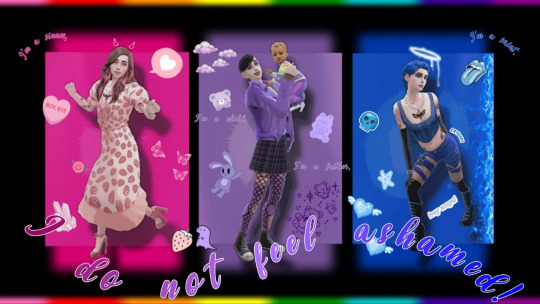
Since I was a kid, I knew I was "different." I didn't know what words like "bisexual" or "gay" meant, all I knew was that they were things my parents didn't approve of. As I got older, I learned those words, and I learned the awful connotation that came with them. I was called a delinquent, I was told I was greedy, that I was somehow sinful for the way I was born. Things were assumed about me; that I could never be a good father or a significant other, that I was a cheater and/or a whore. I was told a lot of shit, and I believed a lot of shit, but I'm here to tell you know of it is true. We are all so much more than our sexualities! We are your loved ones and your worst enemies. We are sinners and saints. We are fire and ice. We are liars and honest. We are evil and good. We are different and the same. Perfectly contradictory, but perfectly blended together. We are everything, everyone, and anything in between!
POINTS
ORIGINALITY: 8/10
STORY: 10/10
EXECUTION: 7/10
STYLE: 8/10
Ember Arendse by @wolfrynn313
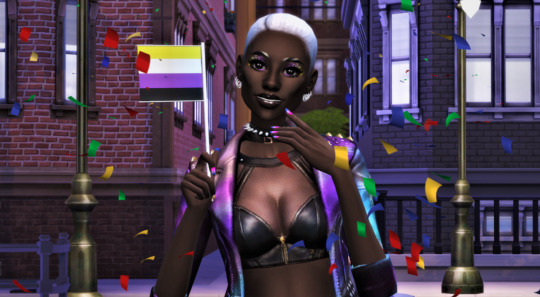
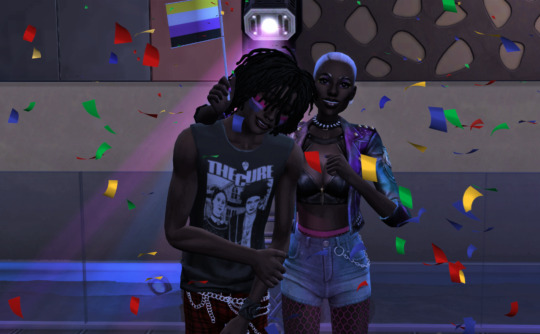
Ember: "I always try to attend the pride celebrations in San Myshuno when I can! Pride is something very close to my heart due to the fact that it's a time of the year where I, along with many others, can celebrate our sexual orientations and identities (And this very much includes Ace people as well!). That having been said, I am sadly all too aware that not everybody is fortunate enough to have accepting blood relatives embrace them, which is why it has been so important to me to support my brother Phoenix, who came out as bisexual four years ago; and now that he's 18 I've finally been able to introduce him to my favourite gay club" (pictured)
POINTS
ORIGINALITY: 8/10
STORY: 10/10
EXECUTION: 8/10
STYLE: 8/10
Dillion Carter by @mewo-ita

Their tiny, punk-rock band hadn’t started out very prideful. How could it be when it consisted of closeted and queer jocks, nerds, and cheerleaders from their high-school? They were first bought together by a non-binary punk transfer student— Dillion. Each song, outfit and neopronoun they shared in secret went against their assigned roles by society; both inside and out of school. Each member’s shared love for music outweighed the other’s socioeconomic stereotypes. However, they insulted each other and got into arguments constantly in the beginning. Multiple times someone had left only to come back a few days later. But the actions that had once held deep shame, denial, and phobias blossomed into confidence and acceptance after all the commonalities and time spent together. It wasn’t strange these days to find them in a group cuddle after practice, at a sleepover, or just hanging out as friends in public. By the time they were in college, their group of outsiders had turned into a close-knit family. For once in the years of all the questions and hiding, the teens found themselves happy they weren’t “normal.” Today was the day they would go public with their band while in front of a live audience. With a shared nod, they stood tall in their poses and bright grins as the instrumental of "Moonlight Densetsu" kicked in. What was there to be afraid of when they had each other?
POINTS
ORIGINALITY: 10/10
STORY: 10/10
EXECUTION: 9/10
STYLE: 8/10

GOOD WORK EVERYONE!~
This weeks prompt just brought me so much joy seeing each and every one of the edits. I applaud you all for the dedication <3 Thank you everyone who did submit this week, this was my fave prompt so far! I can't wait to see what you creative legends make for week 5!
INFORMATION FOR THE NEXT PROMPT WILL BE RELEASED AROUND 10:00PM AEST 18th of June [Keep in mind, this will be the 17th for many of you haha]
This week's prompt hint!

That's all guys! Can't wait to see what everyone does for WEEK 5!
- Buddy
12 notes
·
View notes
Text
just finished the sun and the star and im posting this from my phone but i have to write my feelings down so spoilers of course:
first of all, i get it. this is not a fanfic, this is an actually rick riordan book and i can't expect it to go dark even though the story and the characters on it totally deserve to be put into a more mature light, so i'm trying to be more open about all this, but..... i'm really disappointed.
the writing was flat. the only reason i had any sort of sympathy to the characters and what they were going through was because i already knew them beforehand, but even then they felt like.... strangers. i think rick needs to stick with first person povs, because (and this also something i struggled with when reading the heroes of olympus series) he can't do multi character stories that well. i thought mark could help with this, but it honestly felt all over the place.
and i was expecting some character inconsistency throughout the book and messed up timelines once again, but it still surprised me how obvious those mistakes were. for example, we have nico being an advocate for change: people change, they learn from their past experiences and evolve throughout their lives and this is the whole reason why we are going into this quest! the whole reason why nyx is after me! and not even a couple of chapters later he finds out one of the giants did just that and found love and acceptance and he just flat out refuses to accept this. uhm, what? will has to remind him he's all about change? nico: oh yeah! my bad! forgot we were doing that
( see: chapter 19: ‘You see the trogs,’ said Screech-Bling. ‘You see Bob the Titan.’ Will smiled and squeezed his hand. ‘Nyx hates what you represent – change.’ / and then, chapter 22: "Nico scoffed. ‘You didn’t meet Geryon. You don’t know what he’s like.’ ‘Was like,’ said Menoetes. ‘Was. Because now you don’t know what he is like.’ Nico was left speechless. ‘Maybe we should give him a chance,’ said Will. ‘We both know people who were once terrible and then turned things around.' )
and don't get me started of the morals on this book. we get it, it's a book for middle schoolers, but you don't have to state the message of it every single chapter for it to be obvious. we get it, this is about changing and owning up the past but trying to be better in the future. not everything is black and white. okay. oh, ur gonna mention it again? oh, ur gonna get a goddess to spell it out for no reason at all? okay.
and god.......... the whole solangelo situation, i'm so SAD. i love them together, i adore them. but those stories about how they got together........ nico somehow deciding he was gonna tell the entire camp he was gay........ will kissing him for the first time just when he was grieving jason after he died (why. why would any of them think this was okay. WHY)........ i know these situations "make sense" and are explained in the book, but i don't like them. i don't. and i refuse to acknowledge them.
well, no. i'm actually going to acknowledge the whole coming out scene and how the story treats the whole thing. (disclaimer: not every queer person has to agree on this, we all have different experiences and that's fine, this is just my opinion on the matter) i hated how it felt like they were using nico's character as this big pamphlet advertising the "gay is okay!". i know his sexuality is a Big part of his character, and he is the first gay character in the pjo universe, but why did it feel he was also the first queer demigod at the camp? why did it have to be a big deal? i think the whole scene about juniper messing it up and him "choosing" to ask will out and also come out to the entire camp at the same time was..... unnecessary. i didn't need him to say he was gay in front of the entire greek camp, he can be used as an inspiring story for any other demigod just choosing to hold will's hand at dinner.
(and is...... a greek camp...... i can understand internalized homophobia on nico bc of his upbringing, and also anyone can have it no matter their experiences, but..... a greek camp..... and a public coming out scene after the whole thing with cupid.......)
(side note: not even one mention of patroclus and achilles. NOT EVEN ONCE.)
and i think what really sealed the deal for me was hazel. well. THE LACK OF HER. does nico remember he has a sister? does mark knows he has a sister? does rick???????? me, throughout the book: oh so this is the chapter where i get some hazel and nico crumbs! no? okay so the next one! oh, still no mention of her? so the next chapt-
she's mentioned 6 times. 6 times. and only once he's allowed to actually think about her. i hated it. and it was worse with reyna.
(the fact nico thought about annabeth and percy AND JASON? (WHO HE WASNT CLOSE WITH AT THE MOMENT) WHEN HE WAS GOING THROUGH TARTARUS ALONE? BUT DIDN'T THINK ABOUT HAZEL? HELLO?)
and even thought the message of the book is about how light and darkness can coexist within one self (as we are... repeatedly told..... all over again...), it still rubs me the wrong way how, at the end, darkness is still portrayed as something.... bad.... that u have to live with. like will says "‘But now I know that it’s not about conquering, or vanquishing, or any of that kind of hero talk. Sometimes it’s better to learn to live with the darkness.’" uhmmmmmmmmmmmm
all that being said, it was a..... fun book. not life changing and I'm definitely ignoring its existence, but the plot was entertaining enough and i did cry when bianca, maria and hades showed up because i adore the di angelo family. also will has powers! that's cool! i guess!
oh, and nico's little demons/children/whatever they are..... cute. in my head they are like those dust bunnies from ghibli.
#and im not even going to talk about wills whole dilemma with accepting nico's darkness or whatever tf he had going on for the entire book#like i get it but i also dont#should've stayed in the drafts 😁#tsts spoilers#the sun and the stars spoilers#the sun and the star#tsts#nico di angelo#will solace#solangelo
8 notes
·
View notes
Text
Book #110 - Goddess by Josephine Angelini
(at which point am I allowed to call all of this bullshit insulting)
How is it that I have yet to come upon an Iliad retelling that follows the "Helen actually wants to be there" idea which doesn't just straight up suck? I'd like to think I'm open to that. It shouldn't be a guarantee for failure.
So then why the fuck do all of those retellings/adaptations paint the Greeks as barbaric savages with DV eyes who never heard of compassion or decency, let alone hygiene, and all the Trojans as these kind, charming pretty people who could never do anything wrong, ever? Why do they all lack moral nuance. Why are they afraid of holding their protagonists accountable.
And even among those, I have never before witnessed one that flinched so hard at even the suggestion of narrative accountability. The book keeps making shit up to take as much responsibility from its faves as it is humanly possible, and it should have become comical at some point, but instead it just kept getting worse.
Anyway, some choice quotes and highlights fom my notes:
- So Orion's mum is "insane", "the kind of insane that is dangerous to be around" (yes, those are direct quotes). Such a tactful, nuanced portrail of mental illness. Bravo, truly. Bravo.
- If I understand this book correctly, then all the Starcrossed House of Atreus inherited from the actual House of Atreus (Agamemnon, Menelaus, etc.) is the name. Which is disappointing. Petition to rename it House of Helen or something?
-So... Paris looks like Lancelot who looks like Lucas who looks like Orion's dad who looks like Odysseus, and all of them look like Poseidon. I... I don't think this was thought through, tbh.
- light note: Hector went swimming in jeans. Was very astonished that he managed to keep his cool during the confrontation with Apollo, while his legs were in the grips of a denim boa constrictor. (who goes swimming in jeans????)
- speaking of that scene... "It was a queer-sounding cackle - not human, and a little less than sane." (again, direct quote.) Someone tell grandma that you can't say shit like this anymore, what the fuck. This came out in 2013, ffs. Jesus, you're lucky I read so much 19th/early 20th century lit, or I might have interpreted that sentence in a 100% less charitable light. (also, of course it has to be Apollo who gets described like this... not defending Apollo, just not a fan of biphobia or -erasure. which, yes, of course all his targets/victims here are female. did you expect anything else?).
- Since the presences of neither Demeter or Artemis get even alluded to at the duels/war, I'm choosing to picture them taking one long look at all of this and then saying "nah, we're good. we're just gonna sit this one out." and then they're just chilling on Olympus, maybe taking a nature walk while the rest of the fam go embarass themselves.
- Matt-as-Achilles looks at Hector and thinks "aw, him and his gf are reuinted. They were always such an awesome power couple. Hope it turns out better for them this time." And I ask, again, at what point am I allowed to call this insulting. Like, sorry, but if I suddenly got possessed by a magic dagger that sorta kinda turned me into a reincarnation of Achilles, I would not look at the splitting image of Hector of Troy and think anything other than "Hey. That's the guy who drove me into the deepest grief and the loudest wrath back in the war. I almost went insane because of him. Threw away my life and my principles just to kill him."
Be serious.
- Why invoke shit you're never gonna follow up on. Why tease me with Arthuriana like this when you're not gonna do anything with it? Why promise me Nemesis when you don't even seem to be aware who she is??
- Why am I supposed to sympathize with God!Helen? Or any of her immortal posse? Also, why did this book end up punishing Ariadne so hard? She didn't do anything, did she?? She didn't even make a moral decision, she just sided with her bf. And everyone else got forgiven for that! Also, she deserved more than being a stand-in for the bland non-character that is Briseis. She only got that face so this version of Achilles would have a girlfriend (which hurts to type) and that's honestly just... yeah, it's insulting. To everyone involved.
- OH. Btw, Patroclus gets, like, name-dropped, once, when Helen remembers Achilles challenging OG Hector, "half-insane with grief", but nothing comes of that comment, it's a single sentence, and then the whole ordeal doesn't even get alluded to anymore. Matt fights Hector on moral grounds alone, on an issue that gets side-stepped later anyway, and- ugh.
- Every single relationship in this book is either a bad idea, rushed, toxic, or any combination of these. The Hector/Andromache speedrun especially was done in some very speaky clownshoes, and... ugh, did we have to make Orion a nonce? Did we? Did we really? You don't have to pair up everyone at the end, you can leave the fourteen-year-old prophet alone, Jesus. It's not that hard.
I wanted to do a contemplatative post for this last one. Look back on the series as a whole, reflect a bit... But no. No, I needed to yell, again. Because sometimes you just need to write a comprehensive list of why nobody should spend money on something. And I'm so very glad I didnt.
Reading this trilogy felt like chugging poison. Like I was doing a keg-stand, but the keg was full of poison. Well, folks, the keg is empty. And I'm gonna read some really fluffy shit now. Teeth-rotting queer fluff extravaganza. Fuck you.
#goddess#josephine angelini#starcrossed trilogy#i'm sorry that my rants run so long#and i know that no one really likes them#i don't either really i just need them out of my system#it is what it is i guess#dante's discard pile
3 notes
·
View notes
Text
I’ve always understood, even before I knew that word, that the monstrous is always a placeholder for queers. I was one of those kids who was disappointed when the beast turned into a prince.
Not just haha, monsterfucker, but because it was the only story I had where the girl was given an alternative to a man. This isn’t something I just made up, either. The movie plays with the dichotomy of man and monster
“We don't like what we don't understand and in fact it scares us, and this monster is mysterious at least.” Gaston is framed as the manliest man, the most desirable man, which is the opposite of a beast.
This is all prologue to this story, Python and Apollo. Nowadays, we like Hercules, but to the ancient Hellenes, Apollo was THE hero of Greek myth.
Apollo’s temple was home to the Oracle of Delphi, they called her the Pythia, possibly the most important figure in Hellenic religion. But originally, the Pythia was associated with Python, hence the name
So with this understanding of the monstrous, Apollo and the Pythia represent a heteronormative pairing, Man & Woman. The Pythia had to remain a virgin so her body belonged to Apollo. We’re in the headwaters of modern purity culture now.
So if Apollo is Man, what is Python? Even if Python is male, Python isn’t a Man. Which is intriguing because the Pythia’s communion with Python is deeply intimate.
When the Pythia sat on the Adyton, and gave her prophecies, she breathed in vapors believed to be the sickly sweet fumes of Python’s rotting corpse. Python enters into her body, and possesses her body.
But I got curious when I found out how Python died. See, it’s a story you know, even though you don’t know it. It got christianized as St. George and the Dragon. It’s Bowser and mario. The ur-Dragon and princess story.
Why Python was killed didn’t need explaining, because I was conditioned to imagine it kidnapped the Pythia. Only it didn’t. In the myth, its the divine embodiment of the-straights-are-at-it-again, Hera and Zeus that are to blame.
Zeus fucked around and knocked up Leto. Hera takes out her rage at her husband's infidelity by using her god powers to make Python devour Leto. Leto gives birth to Apollo first, and Apollo slays Python to protect his mother.
Python wasn’t the Oracle’s kidnapper, it was her loyal guardian. Her companion. And with no protector now, Apollo took over that duty. Myths do not tell us if the Pythia wept for her friend
In this initial telling of a story retold over and over again, we find a truth that has had to be blotted out with each retelling. The Princess was happy with the monster, and the monster did nothing wrong.
Something so radical, that that Dragon had to become the embodiment of all evil, to blot it out. This is foundational stuff to western culture. The Dragon becomes the ultimate enemy of christianity for this.
At this point, I had the idea, but I didn’t think it was true. I thought my interpretation was personal and idiosyncratic and totally out of line with the actual text. My whacky headcannon. And then I started reading.
Did you know that our earliest source on Python, Homer’s Ode to Apollo, refers to Python as ’drakaina’, a dragoness? How very odd, and odder still that they changed it later…
Herodotus tells us that the Pythia learned their craft from Egypt. Egypt had their own oracular tradition, centered in Per-Wadjet, an entire city devoted to the Snake GODDESS Wadjet.
Wadjet herself is an interesting figure full of queer imagery. She’s depicted as a woman, with either a ‘white vulture’s head’ or ‘an erect cobra head’. Use your own imagination for what those might mean.
So Wadjet is transmitted to a pre-Hellenic Greeks as Python. Likely through the Minoans, who also were really big on Snake Goddesses, and also, women’s rights.
The Hellenes were not. A woman’s place was either as part of her fathers house, part of her husbands house, or a sacred virgin. While the Hellenes celebration of MLM relationships makes them popular with today’s queers...
if you were a woman your sexuality was strictly controlled in Hellenic society. This is the reason reason Python had to be dethroned, and a man put in control and possession over female divinity.
This is not exactly a new theory, Robert Graves pioneered this interpretation of Python as a pre-Hellenic deity. But Graves mistake was attempting to universalize an ideal pre-historic feminine religion.
I’m not. I’m making a specific and more clear claim: That Wadjet was transmitted from Egypt to Greece through Oracular Traditions, and these had to be suppressed by the hellenes for their sapphic sexual connotations and practices.
This wasn’t the end of the story though. Feminine divinity was too powerful for the Greeks to do without entirely. And Greek women rebelled religiously, through the cult of bacchus.
If you think Bacchus was just the god of like grapes and shit, you’re wrong and in for another wild tale some time. Interestingly, Bacchus vied with Apollo for the Temple of Delphi, before ‘willingly’ yielding to him.
Funny how Apollo keeps getting control of the Pythia without doing anything to pursue that. It just keeps falling into his hands, he doesn’t seek power. We have one story of Apollo interacting with a prophetess.
It’s from the Illiad. Apollo sees Kassandra in a temple and desires her. She says no, and for this he curses her. She will tell the truth about the future, but she will not be believed.
The greatest hero of greek myth is one who makes sure women will not be believed. This has startling ramifications that are with us today. The story mythologizes reality, of queer women being controlled and killed.
This is to suppress Gnoesis. Direct knowledge of the self and ultimate reality without the intervention of the senses or reason. By bodily communing with the dragon goddess women fulfilled the Delphic maxim “Know thyself”
All of this is context to say: I am now starting a sex cult. The ancient greek queers could see the future and achieve gnoesis by having sapphic sex with dragons, and I am convinced we can too.
The First Floridian Church of the Sapphic Dragon Epiphany is available for Weddings, Funerals, Orgies and the search for Gnoesis and new and exciting drugs.
This is not a joke. $50 and travel expenses gets you my religious services for the day. Coming soon I’ll be offering ophidiomancy readings to reveal the future. There will be T-Shirts.
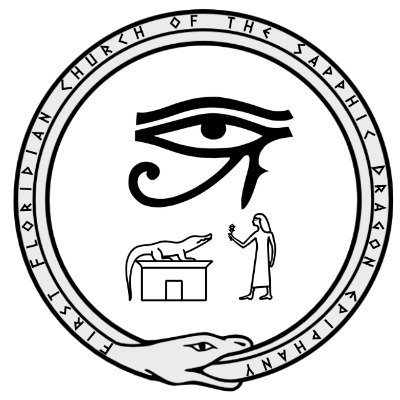
18 notes
·
View notes
Text
despite everything, i still read new scp articles every now and then (tho much less than before) and now i have Criticisms on an article per usual, this time being SCP-7454
to summarize: SCP-7454 is a humanoid entity whose name used to be Aphrodite, the Greek goddess of love and beauty. The Foundation became aware of them when they disrupted a feast dedicated to said goddess, "calling out" those at the feast, and agents were sent to contain them. anyways after a few conversations between the entity and a researcher, the entity releases they identify as a male instead of female, and with some encouragement from the researcher that the Foundation will help them with gender-affirming treatment. it ends with the entity deciding his new name will be Issac. The end
of course, the article was posted last week, so im trying to be nice. that said, the writing feels almost juvenile, especially with how the entity, Issac, acts and speaks. He doesn't sound like a (former) Greek Goddess who's been around for a loooooooong time at all, he sounds more like a rebellious teenager who's familiar with social media. look, im not saying Gods can't act "modern" and whatnot, but it's kinda hard to take Issac and the article as a whole seriously (when it needs to be) when he's using cuss words like "fucknut" and urinating over a statue of his former self. in addition, when the researcher speculates out loud that Issac is transgender, it just feels like the researcher is just saying it to our face; there are zero attempts at being subtle at that part, or even Issac figuring out himself. more of a personal gripe on my end, given i like it when themes and main ideas are more subtle rather then in your face.
another thing: there were posts on here that were like "i'm tired of feminist/queer retelling of storytales/mythologies because they refuse to engage with the source material in the first place". While those posts were mostly aimed towards YA novels and the like, i feel like it sorta applies to this article as well. the readers are told the skip was, or at least claimed to be, Aphrodite, but as I said before, he barely even acts like a proper God at all beyond complaining about his divine family and his worshippers and whatnot (and even then his family is only mentioned). when Issac complains about having been known as the "Goddess of motherhood", i genuinely got confused cuz I've also seen Hera as the goddess of motherhood. this ended up being half right on my end; Hera is known as the goddess of childbirth, marriage, and women, and there are two websites that associate motherhood to Aphrodite (albeit one of them was because Aphrodite threatening her son with a sandal ended up being a tradition for mothers around the world), so I'll give the author that.
point is Aphrodite, or Issac as he goes by at the end of the article, doesn't feel like a God at all. Different interpretations of the Greek Gods exist in other media, and whether they're accurate or not, they do tend to be decent interpretations, even Rick Riordan's. SCP-7454 feels less like the (former) Goddess of Love and Beauty from Greek culture and more like a regular guy with identity issues and an oppressive family who happened to have the name "Aphrodite" slapped onto them.
now, i admit i know jackshit bout writing, but i do have Ideas. For this scp article, if i were to change anything bout it, i would have there be a revelation that Issac isn't actually Aphrodite, but rather a child of Aphrodite. then all that would need to be added is that Issac confesses they came from a family that had expectations thrown onto him because his mother is the Most Beautiful Woman, and that gives him gender dysphoria. Even if everything else stays the same in the article, I would've ended up liking it better. Hell, if you want to do a transgender Greek God, you could always use Hera: make Hera want to break away from being a Goddess of Woman + motherhood as they release they might identify as male, but Zeus forbids it, so Hera runs away for the Foundation to find them, and agrees on the condition they shield Hera from Zeus.
Also- Issac? there are at least ten names out there, and the former god chose Issac of all names?
#scp foundation#this ended up being a lot longer than intended#again im not trying to be too mean but i also do like complaining/criticizing every now and then#i wanna make a positive post about scps soon too#also i had to jump between this tab and the scp article bc i genuinely kept forgetting the main details
1 note
·
View note
Text
some of the HHAWFAIGM (Hypnos has a weird family and is going home) Universe head cannons.
so This is basically Hypnos having a found family made of Egyptian Norse, Celtic, Greek, Roman, Chinese, Japanese and Mesoamerican gods.
headcannons 1#
the goddesses vesta and Hestia are like vodka aunts very the nicest, sweetest people you'll ever know except in case you threaten their family then you might as well wish and ask the gods to spare you because they won't.
Hypnos is the 2nd youngest of this found family and Makira is the youngest. Hela and Morrigan are Hypnos's favorite aunts on the Norse and Celtic side of the family.
When Hypnos's partners came to Pluto and Proserpina to ask for his hand marriage Mictlantecuhtli and Mictecacihuatl Met group I absolutely said nothing yet terrifying them.
Pluto had to break the silence and then of course Morrigan came in with food and they talked about the festivities but the other two were ready enough to beat the crap out of them if they ever hurt Hypnos.
Xolotl made the whistle which Hypnos has.
the miss American deities are like the Russian uncles and aunts or cousins of the entire group most importantly they helped Hypnos get out of his shy shell and be confident in his domain.
Set is the most trans ally you've ever met and yes he did in fact help Hypnos find himself when he did come out same with Osiris same with Anubis.
Cernunnos i is the same guy that helped tiptoes with his flashbacks in bad nightmares when he was freshly end with his domain same with
Somnus, Anubis and Makaria are Hypnos's siblings.
Yama is his closest cousin.
Yama is the Indian god of the dead I think or death but he has definitely the God of justice and I imagine during one of these meetings Hades was trying to figure out a more efficient way of keeping track of all those souls instead of just a giant board with a bunch of tallies when Yama came up with the idea of a system paperwork like what you see in the Hades game.
Ereshkigal taught Hypnos How to make up and how to dress better and that's how he found his style after he came out. Hypnos sees her like a great aunt.
Hades is gender Queer and is seen as a best friend by Hypnos he married into this found family.
The place and group is called the House of the lost sons as in children and Izanami who is the goddess of the underworld in Japanese mythology is like the grandmother figure or mother figure to the more older ones and it is so funny that the Mesoamerican deities will gladly murder you over five bucks but will absolutely murder Zeus for hurting Hypnos.
How Hypnos sees his found family
Makaria- Greek- sister- greek
Cernunnos-uncle-Celtic and Gallo-Roman
Morrigan- aunt- Celtic
Arawn- Welsh Celtic- cousin
Hela- Nordic- aunt
Anubis- Egyptian- brother
Osiris- Egyptian- friend or uncle
Set-Egyptian- uncle
Mictlantecuhtli- shorten to Mictlant- uncle
Mictecacihuatl- shorten to cihuatl- aunt
Xolotl- Aztec- great uncle
Yan Wang- China- cousin
Izanami- Japanese mother goddess- mama or abuela (Spanish for grandma)
Yama- Indian Hinduism- cousin
Persephone- aunt
Pluto- Rome- dad
Hades- friend
Ereshkigal – Babylonian- great aunt
Somnus- brother
Donn- Irish Celtic- half brother
Hunhau- Mayan- aunt-uncle
Uacmitun- Mayan- aunt
Proserpina- Roman- mom
1 note
·
View note
Text
10 Myths About Hellenismos
Today, let's address some popular myths (and the truths) about Hellenismos and its deities. Not very surprisingly, most of these things come from Wicca or Christian colonization. You can believe these things if you want, they just aren't from the religion.
Myth 1: Deity work is dangerous
Truth: Deity work, in Hellenismos, isn't any more dangerous than worshiping the Christian god is supposed to be. This notion didn't originate in Hellenismos, and is also a largely neopagan idea. Our theoi aren't monsters or aggressive. They won't kill you over tiny mistakes. Just respect them, do what you can, and you'll be fine.
Remember that even in the mythos, people aren't smited for the wrong offering. They're smited for blatant and deliberate disrespect, which by nature can't be done accidentally.
Our deities genuinely aren't easily angered. They wont be mad if you reach out to them, if you confuse them for something else, if you give them the wrong offering, etc.
Myth 2: You need to look out for entities impersonating deities
Truth: Again, this isn't remotely from Hellenismos. Our gods cannot be impersonated by evil entities. Frankly, we don't really have entities with that desire or power in the religion. If you're contacting a Hellenic deity, and you get an affirmative response, you contacted them. The idea you didn't, or that something else is lying to you, is from outside the religion. Our deities are more powerful than random ghosts, and our religion doesn't have that concept.
Myth 3: Hekate is a moon goddess/crone
Truth: Hekate is associated with the moon, but she is not a goddess of the moon. She is the goddess of one lunar phase--the dark moon, which is on the eve of Hekate's Deipnon. She is also not a crone goddess outside of neopaganism and Wicca. Historically, she was depicted as a maiden. Her triple form was also not maiden/mother/crone, simply a triple maiden-esque figure.
Myth 4: Hestia gave her seat to Dionysos/Apollon took Helios's chariot
Truth: Honestly, it's just a difference in counting. Some deities were and weren't Olympians depending on time, culture, and locations. No seats on Olympos were "given up," it's just that sometimes one is there and sometimes the other isn't.
As for the chariot, no. Apollon didn't replace Helios. They were synchronized, but Apollon didn't "take" the chariot, and Helios was never removed. Helios is still the sun--his name is literally "sun."
Myth 5: The myths are history/Hellenic Polytheists believe in the myths
Truth: The characters in myths are real to us, and some myths are literal, but in general, Hellenic mythology is not meant to be taken fully literally. Most of it is symbolic. Additionally, a lot of the r*pe in the mythos is translation errors. We believe in our heroes and our gods, and we believe there is truth in the myths, but no, our mythology isn't like Christian mythology--it's not expected or really encouraged to believe the myths are strictly true history. The myths aren't even consistent over time and location, so it's simply impossible to believe in all of them at once. But no, our gods do not act the way they do in mythology. Myths are by and for mortals, and do not capture the divine.
Myth 6: It's disrespectful to dress up as or write fiction about the gods
Truth: This is just ridiculous and ahistoric. The majority of Ancient Greek theater was deity cosplay and fanfiction. I said what I said.
This can definitely be done disrespectfully, but isn't inherently disrespectful. You also aren't required to represent the theoi fully accurately in this.
Myth 6: X god is Y orientation/gender
Truth: While you can certainly theorize our theoi's sexuality, and none of our gods are cishet by modern standards, none of the gods can only be interpreted as one gender or orientation. The terms we ascribe to them are based on mythos, portrayals, and modern interpretation of historic social roles.
The most common of these theories are maiden goddesses as aroace (ie. Hestia, Athena, Artemis), erastes (top) gods as bi men (ie. Zeus, Apollon, Patroklos), eromenos (bottom) gods as gay men (ie. Ganymedes, Hyakinthos, Akhilleus), and Artemis as a lesbian.
None of these are wrong, to be clear. It's just not as simple as using our modern labels for them. Erastes and eromenos were both considered straight in Ancient Greece; being a 'virgin' didn't always mean celibate; Artemis can be interpreted as bi, lesbian, and/or aroace based on her myths. You can interpret them however you like--I certainly interpret my gods as queer--but there is no single right answer.
Myth 7: You need a patron or to be devoted to someone, or can only have one patron/be devoted to one god, & devotion is an oath
Truth: Patron deities are more of a principle in neopaganism and Wicca than in Hellenismos. Worshiping the theoi does not require you to find a patron or devote to a deity, ever. Patronage is not particularly important or common, unless you are thinking of a patron god of a trade (ie. if you're a blacksmith your patron is Hephaistos).
Devotion is also not exclusive, and never requires an oath. Oaths in Hellenismos are extremely serious, and should never be taken without extreme caution. If you aren't willing to die if you break the oath, don't make it--find something else. You probably wont die, but that's the necessary level of certainty. Devotion, while serious, is not as serious as being oath-bound. You can be devoted to multiple deities, and devotion can be called off if needed. You can't really call off an oath.
Myth 8: X god is a r*pist!
Truth: Please stop it. Just stop it. No. Especially if you're basing that on Lore Olympus. The mythology isn't fact, weird inaccurate mythology fanfic written by someone who doesn't know anything about the myths isn't fact.
The mythology isn't straight up history. The myths were often mistranslated (the Greek word for r*pe didn't just mean r*pe) and they aren't facts. They were also products of their culture. So. No. They are not. And their worshipers aren't r*pe apologists.
Myth 9: Titans are evil and/or Olympians hate titans
Truth: Titans are fine. Really. They're not evil, they're not going to hurt you. They're just another kind of Theoi. Many of them were actually a large part of the historic religion. Hekate's Deipnon was a monthly festival, after all. And no, Olympians don't hate titans. Remember the point about myths not being literal.
Myth 10: The gods are jealous
Truth: No, the gods will not be jealous if you worship another god. They wont be jealous if you worship another pantheon, or if you need a break. If you're a god consort, they won't be jealous if you're interested in other mortals or deities. If you're a devotee, they won't be upset if you devote to other deities.
The most jealous a god gets is upset if you break an oath, promise, or agreement with them. If you promised them a daily libation but skipped it for another deity without permission, they may get upset. But even then, that's not really jealousy.
Myth 11: If you work with X deity, you can't work with Y
Truth: This is usually based on rivalry in mythology, and isn't true at all. Related to the above jealousy point, no deity in real life hates another deity, especially not enough that if you worship both they'll be upset. You can worship Aphrodite and Persephone. You can honor Hera and Leto.
Most of these gods are actually happy if you honor other theoi. Many of them are family, or share domains.
If enough people are interested, I might make a part two, because this is barely the tip of the iceberg. RBs welcome from pagans and non-pagans alike.
#hellenismos#historical hellenismos#ancient hellenismos#hellenic pagan#hellenic polythiest#hellenic witch#hellenic worship#hellenism#theoi#hellenic wiccan#wiccan#deity witch#deity worship#theurgy#r*pe tw#r*pe mention#deity work#greek paganism#greek pantheon#greek mythology
2K notes
·
View notes
Text
AURORA: THE GODDESS WHO TOUCHES HEARTS
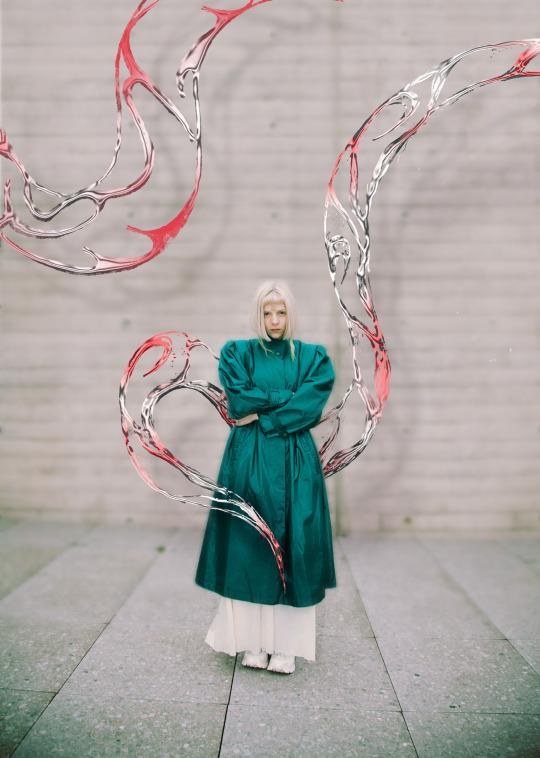
Interview for tmrw magazine by Alex Brzezicka (February 11th, 2022).
AURORA walks us through the path stoned with thorns and petals that led to her new album, suspended between heaven and hell.
“I think of myself, my own body, as a goddess but I also think of you as a goddess and you as a god,” Aurora says to me. It’s a bizarre moment of catharsis: we’re on the ninth floor of the Universal Music building in the centre of London, though it feels as it could be the peak of Mount Olympus with Zeus about to send a lightning bolt our way. According to one of Norway’s most enigmatic artists of this decade, profane and sacrum clash more often than we’d think. Only in that clash, we can find the golden mean. In between sadness and serenity.
On her fourth album, The Gods We Can Touch, Aurora brings heaven and hell back to Earth. She sends shivers down our spines as we convert to her coven descended from the Garden of Eden, the 21st-century children of Eve. As she was the first one to eat the forbidden fruit, we are the first ones to feel no shame when embracing the pleasure and essence of who we are within. Subverting biblical symbolism, inspired by the bravery of the queer community and pantheon of Greek gods, Aurora ascended to a self-assembled studio in a 400-year-old castle in Norway to give birth to a painfully beautiful project. It’s a joy-sprouting celebration of diversity: the message of love embedded there has the power to melt even the coldest and the hardest of hearts.
For an artist who came up with such a grand idea, Aurora seems surprisingly grounded. She’s interacting with surroundings on her terms, whenever it’s a spontaneous series of humming or a plant-petting moment just before we shoot. It’s surreal to think that she’s a viral social sensation, following the re-emergence of her single, ‘Runaway’ (written when 11-years-old), as a TikTok trend. It’s even stranger that at the centre of her magic veiled in enchanting vocals and spells-like lyrics, hides a human.
Following Aurora’s example on the ‘The Gods We Can Touch’, we should dethrone our deities and burn precious castles we built for them in the skies. Staring at the fire, we’d see a flashing glimpse of our past lives when, once, someone put us high up there too. We were grateful to come down. In the society that praises perfection as a virtue, Aurora dares us to show off our flaws and, stripped from the false pretence, stand proudly in front of other beings. Leaving shame behind, let’s dance altogether, drink wine and make a toast: to the dark, the light and love in it.
YOU’VE JUST RELEASED AN ALBUM AND IT’S ABSOLUTELY STUNNING, CONGRATS. IN YOUR PREVIOUS ONES, YOU’VE PORTRAYED MORE OF AN INWARD JOURNEY. THIS TIME IT FEELS LIKE YOU WANT TO TEACH PEOPLE ABOUT THESE BIG, OUTWARD CONCEPTS. HOW THAT CHANGE OF PERSPECTIVE COME ABOUT?
I often react to my own work when I start my next work because for me all my albums are a part of a long timeline. I just knew when I had the title, ‘The Gods We Can Touch’, which people can figure out for themselves what it means, what it truly means. I know. I knew that I wanted to make an album about freedom, about not having shame for being different, for being sexual, for being curious, for being not good enough; all of these things that we’re ashamed of all the time. I wanted to make an album that really celebrated the human and imperfect and the raw.
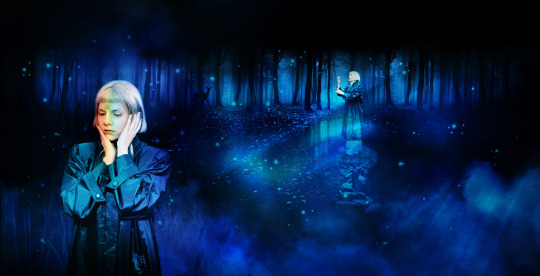
AMONG ALL THE MYTHOLOGIES AND GODS’ OUT THERE, YOU CHOSE THE GREEK ONES. WHAT MAKES YOU FEEL CONNECTED TO THEM?
What I liked about it is to see the mythology of the Western world that I actually resonated with. There’s not so much with the modern Western world that I connect with because the Western world throughout history has brought so much destruction and abuse to the world which is very sad. I like Greek mythology because it included more imperfections. They have more room for humane. They have gods and goddesses to celebrate the very things that modern religion puts shame upon like being a woman, being gay, drinking wine, being sexual, being trans. They all had gods to celebrate these things so I wonder what happened on the way, where we lost that kind of freedom? Why do we have the need to impose control on each other with religion? Because faith is a very beautiful thing, it’s a big part of being a human, this spiritual side.
I COMPLETELY GET THAT. IT’S SO STRANGE. IN THE MODERN AGE, WE DO NEED TO BRING BACK THAT IDEA OF RELIGION. FOR EXAMPLE, THE SPIRITUAL IDEA OF TWO OPPOSITES BEING IN THE SAME REALM: THE CONTRAST OF HEAVEN AND HELL IS ONE OF THE MOST FASCINATING CONCEPTS IN LITERATURE, ARTS OR EVEN PSYCHOLOGY. HOW COME YOU’VE USED IT IN THE ALBUM?
I’m really drawn to contrasts. I’m a very contrasty person. That’s my favourite thing about myself, my contrasts: about life and about the world because everything is so complex. You would be rude to say that everything is not complex because everything is so multidimensional. I’m very fascinated by the light and the dark, heaven and hell and our need to divide the two and to have an all-perfect thing to worship. Even society today is very obsessed with perfection, in celebrities. We’re very obsessed with it and that scares me because it’s very unhealthy. We’re not meant to be perfect. We should love the fact that we are not; that we are diverse and natural. I find the contrasts in everything very exciting. But also, I find heaven and hell much more similar than we think.
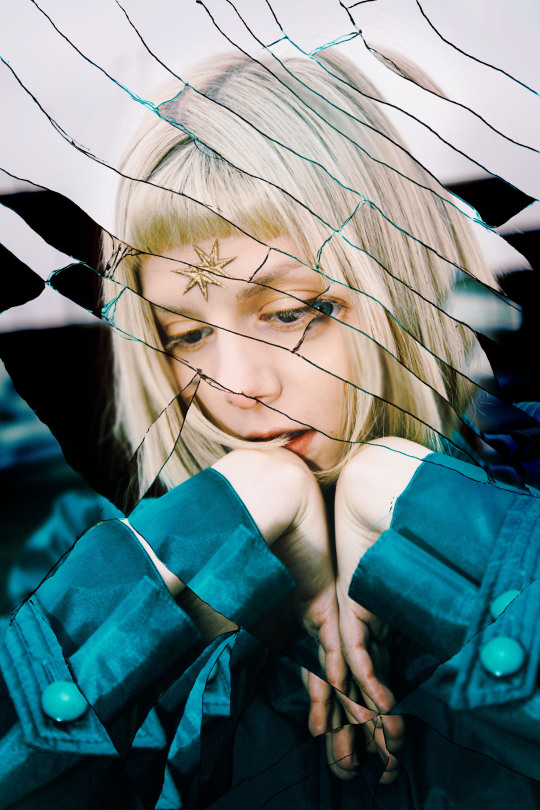
WHEN THEY’RE COMBINED AND THERE’S THIS SPACE IN BETWEEN THAT WHERE ENLIGHTENMENT EXISTS. A LOT OF YOUR ALBUM AND YOUR WORK LIVES THERE…
I am very connected to that space.
WHAT DO YOU DO TO TRANSPORT AND CONNECT YOURSELF TO THAT PARADOXICAL, HOLY DIMENSION?
Well, I meditate and think a lot. I use a lot of time to philosophise. I know if that’s even a word. Because I love thinking about things and wondering why everything is like it is. I am very good at accepting that I am both good and bad. I’m good at accepting that the people I look up to and love can also disappoint me; that the people that I disagree with and hate that there are also things with them that I will love. I spend a lot of time accepting the two sides of everything. I love the sadness in life. I love the happiness. I love the raw and ugly and love the beautiful and pure. I see them all as the same thing. I love the full experience of everything. I see so much beauty in a lot of the things the world has forgotten are beautiful. I think maybe that helps at least to reach that space.
DEFINITELY. I FEEL LIKE WE NEED TO GO BACK TO THE SOURCE, ESPECIALLY THE ANCIENT CULTURES. PEOPLE SEEMED TO FORGET ABOUT THAT NOW. YOUR ALBUM TOUCHES ON THE FACT THAT GODS ARE MUCH MORE HUMANE AND FLAWED THAN WE WOULD THINK. IF THAT’S THE CASE, WHY A LOT OF PEOPLE ARE SO SCARED TO SEE THE GOD IN THEMSELVES BUT IT’S SO EASY FOR THEM TO PROJECT THAT ONTO OTHERS?
I don’t know but I find the same questions really fascinating. I think about it so much. Maybe we need something bigger. Something to strive for. Something almighty, all-knowing, perfect and divine that we can look up to because we love being led. We love serving someone and something which is also strange. I see no fault in that either. I think that could be potentially a very good thing: to strive towards something good and better, reflect on yourself. That’s always good until it starts becoming a weapon toward controlling minorities and controlling the weak in the society, making them weak because it’s clear who has not been hurt as much by these things and who has been hurt by them the most. My biggest issue is when it ends up in the wrong hands and what a great power it is to claim that you’re in touch with whoever knows everything. Like how it started with stealing money from the poor even and then promising them they would go to heaven. It’s like a business more when it comes to money and controlling people, more than the beautiful part of faith which many people also practise in the world.
USUALLY, PEOPLE FORGET THAT THERE ARE TWO SIDES TO IT. THE INSTITUTION ONE OFTEN STANDS IN OPPOSITION TO THE REAL THING. THAT CAUSES THE MINORITIES TO BE DISCRIMINATED AGAINST, AS YOU’VE SAID BEFORE. YOU WERE VERY INSPIRED BY THE QUEER AND DRAG COMMUNITY WHEN WORKING ON THE ALBUM. CAN YOU TELL ME A LITTLE BIT ABOUT THAT?
A lot of the queer community, the drag community and the whole LGBTQIA+ community inspires me a lot because they, to me, are the essence of having no shame when they manage to overcome the shame the world afflicts on them and maybe sometimes the internal shame that they can’t get rid of because the world tells them that that’s how they should think about themselves. If they manage to overcome it, at least slightly, then they become so untouchable because there’s no one… I can’t come up with any other example of the same kind of freedom in expressing yourself and not caring what the world thinks. Despite what the world thinks they shout out loudly in their fashion and the way they behave. It’s incredibly empowering and brave and obvious. That’s exactly how it should be. It’s a very special thing. It’s very unique. When you show the world this, when you celebrate yourself, when you become loud, you also show the world that: ‘You can’t touch me anymore. I can’t be hurt by what you say because I’m embracing who I am’. The strongest, most powerful tool in the whole world is when you’re untouchable. It can’t even hurt you anymore.
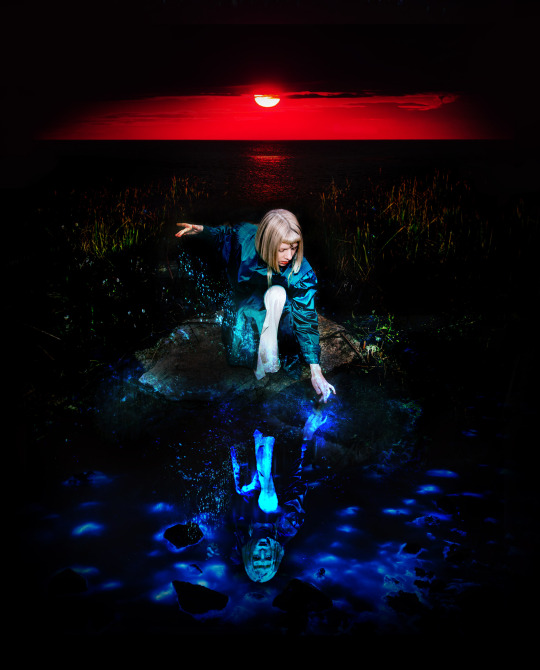
I DEFINITELY AGREE ESPECIALLY WHEN THERE’S LOVE BEHIND IT. WHEN YOU REALISE THAT YOU CAN LOVE WITHOUT ANY LIMITATIONS. THAT’S QUITE BEAUTIFUL.
It is. Also, showing love that you know the world has been fighting against is also very empowering in itself. It’s just so incredibly beautiful and inspiring. I love the whole sentiment of it. I’m part of the community myself but I’m not relating to a lot of these troubles that many people have had because I’ve had quite an easy journey outward. Of course, inward realising that ‘oh I feel like this’, was confusing and strange at the beginning but my meeting with the world has been very soft compared to a lot of people’s experiences. Mostly that’s why I fight for it.
THAT’S REALLY INSPIRING WHEN YOU KNOW HOW DIFFICULT IT COULD BE SO YOU USE YOUR PLATFORM TO SPREAD THE MESSAGE OF LOVE. TALKING ABOUT THE CONCEPT OF LOVE, YOU’RE APPROACHING IT IN SUCH AN AMAZING AND SIMPLE WAY. IT’S EASY TO FALL INTO CLICHES BUT YOU MANAGE NOT TO DO THAT. WHAT DOES IT MEAN FOR YOU TO LOVE?
I think very much of love as a power. I think of it as very complex and divine and spiritual and human and flawed. I think of love as maybe the reason why we’re here. The meaning of life. I mean when we love ourselves; when we love food; when we love children; when we put ourselves aside and love someone else more; when we learn to forgive that’s also love. It’s just when we realise that we have the ability to love and we let love in. I think that we understand a bit of this. Something in us understands why it’s here. It’s incredible. It’s easy to write about love when you think about it in that way. I rarely write about relationships. People always think I do in songs because, I guess, that’s what is normal but I very rarely write about love in a relationship but more as this big thing.
THE UNIVERSAL MEANING OF LOVE. I GOT THAT IMPRESSION IN ‘BLOOD IN THE WINE’. THERE‘S ONE LINE THAT TOUCHED ME, ‘I WAS GIVEN A HEART BEFORE I WAS GIVEN A MIND’. WOULD YOU MIND SHARING THE STORY BEHIND THE SONG?
Well, that’s a song celebrating a bit of the dangerous and raw in us. It’s about enjoyment and ecstasy. It’s about sex as well and liberation. Being proud of and free in your skin and body and with your enjoyment like feast and food and wine and everything. It’s about us celebrating all that is a pleasure here in the world without feeling bad for it. I was thinking about it in the chorus, ‘She’s not a sinner, she’s a lover’. It’s just that it’s not necessarily a sin to enjoy things and to love things or love whoever you want to love. That’s a huge misstep we have taken in our world to misplace a few of these beautiful things as sinful and shameful. This is a very ultimate song speaking up against shame.

WE FORGET TO ENJOY SIMPLE THINGS LIKE THESE.
Because we are meant to. Life is so good with them.
THIS IS SO TRUE.
Even like just masturbating. People are so afraid of it. People are actually feeling bad for something that feels good and then you can do… Like it’s so weird. I don’t understand. We’re afraid to be naked in front of each other. That’s also so weird. We should be able to without it being sexual.
IT’S SO INNOCENT. IT SHOULD BE SO NATURAL.
It is so innocent. The fact that we are making it not innocent, that’s the thing that makes it unpure because it is pure. Our bodies are pure. I hate that we are making it into something bad. Like when we’re telling girls to cover up in school uniforms or in normal schools without uniforms, I’ve seen many examples of girls being told that they can’t show their shoulders. That’s a part of the problem, making our arms something sexual. No wonder we’re getting abused and sexualised. That’s a part of the problem. They’re sexualising something completely normal and innocent and that’s making it worse for us.
IT’S ONE OF THE THINGS THAT WE HAVE TO FIGHT AGAINST AND KEEP ON. I’M REALLY GLAD TO HEAR THAT YOU STAND UP AGAINST IT AND PREACH FOR THE CHANGE BECAUSE I REALLY WANT TO LIVE IN A SOCIETY WHERE THIS IS A NORM.
Yeah, me too. Me too.

FINGERS CROSSED. CHANGING THE SUBJECT, YOU’VE JUST RELEASED A CONCEPTUAL EXPERIENCE ‘A TOUCH OF DIVINE’, CAN YOU TELL WALK ME THROUGH IT?
I got the opportunity to record some of my songs live from the album for the first time so, of course, it’s a bit wonky and flawed but that’s not the point for it to be perfect. I just want it to be raw and real. It’s just a completely new way of doing a live show online. It’s nothing like I’ve ever done before. It’s also a chance to reach out to all people in the world at home so they all can be a part of this release and be included. I don’t know, it feels good.
THAT SOUNDS REALLY AMAZING. ABOUT YOUR COMMUNITY, WE’VE TALKED ABOUT THE CONCEPT OF GOD PROJECTION. I FEEL LIKE THAT HAPPENS A LOT IN YOUR CASE BECAUSE PEOPLE ARE CONNECTING ON A SPIRITUAL LEVEL WITH YOUR ART. HOW DO APPROACH THAT WHEN SOMEONE’S PRAISING YOU ALMOST LIKE A GODDESS?
I feel like it’s ok as long as they remember to praise themselves as a god and a goddess as well. I think of myself, my own body, as a goddess but I also think of you as a goddess and you as a god [points at photographer]. I do because it’s like oh… We are capable of so many things. It’s incredible to be alive and to be functional. We are so complex as well. It’s so beautiful. It’s incredible but I find it scary of course. I find it very scary. But also, it’s important to not think too much about what people think you are and what they need you to be, what they hope you are. It doesn’t matter. You just be what you are and don’t think about what everyone else thinks because I’m just what I am anyway. It doesn’t matter what people need me to be or think I am. I’m quite relaxed about it. I try the best I can to encourage, to erase that kind of feeling and they know it when they meet me. I’m very good at being human.
32 notes
·
View notes
Text
"You want to know what death is? I'll tell you. Death is the loss of life. Despite everything doctors like me attempt... a patient's life can still fall through our fingers. You think death lies in the apex of science? Anyone with such little regard for life will die by my hand."
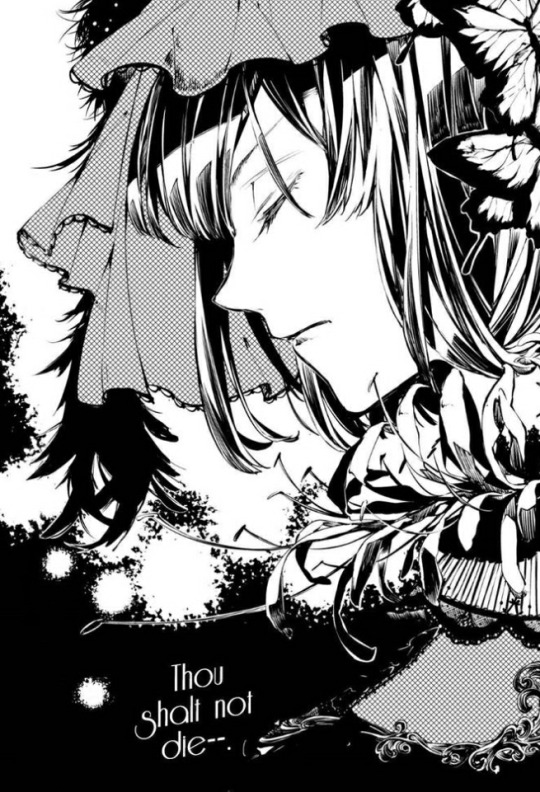
Character Analysis: Yosano Akiko
Age: 25 || Ability: Thou Shalt Not Die
BSD CHAPTER CHAPTER 65-66 SPOILERS
table of contents:
1. Author counterpart.
2. Yosano's history.
3. 'Angel of Death' defined.
4. Yosano and Atsushi.
YOSANO BRAINROT!*(#&!*@#($
1. Author counterpart.
Having been given the “Sho Ho” at birth, Yosano Akiko’s counterpart—the real-life author—was known for her zealous take on both feminism and pacifism.
Side note: Once again, to avoid confusion, I will use the name Sho Ho in reference to the real-life author, and Yosano in reference to the BSD character.
Sho Ho's writings were pretty much out-of-the-ordinary in her time, and despite being suppressed by the social norms of gender hierarchy, she sought to reform society’s view on the cultural perspectives of women and their sexuality (She expressed her love for a woman in one of her poems, but many still argued on whether she identified herself as queer or not.)
"Thou Shalt Not Die," Yosano's ability, is actually named after one of Sho Ho's most famous, controversial poems. She wrote it for her brother, who was a soldier in the war between Russia and Japan (1904-1905). In her poem, she expressed her general distaste for war and how her brother was a part of it.
O my young brother, I cry for you
Don't you understand you must not die!
You who were born the last of all
Command a special store of parents' love
Would parents place a blade in children's hands
Teaching them to murder other men
Teaching them to kill and then to die?
Have you so learned and grown to twenty-four?
- excerpt from Sho Ho's poem, "Kimi Shinitamou Koto Nakare"
Her words were blunt enough to inflict guilt on her brother's conscience, as she wasn't afraid to express her disapproval over how her brother took part in the typical violent bloodshed and manslaughter of war. Such opinions perturbed the authorities, and her work was eventually banned from the public for a period of time. Later on, it was used as an anti-war statement.
2. Yosano's history.
Now, as for the character in BSD, Yosano is seen to be generally strong-willed, and later on, we see that she is terrifyingly compassionately ambitious in the way she treats her patients. She treasured life itself, and hated the thought of losing a patient.
Yosano had developed her relations with Mori Ougai back in the Great War, when she was just 11 years old. Her ability was a great benefactor in saving lives. Realistically speaking, she was used for her ability to heal injured soldiers and diminish the effect of any casualty acquired.
Initially, she wasn't aware of this, until one of her close friends pointed it out by subtly accusing Mori of manipulating her to participate in the War under the close-to false pretence of 'saving lives.'
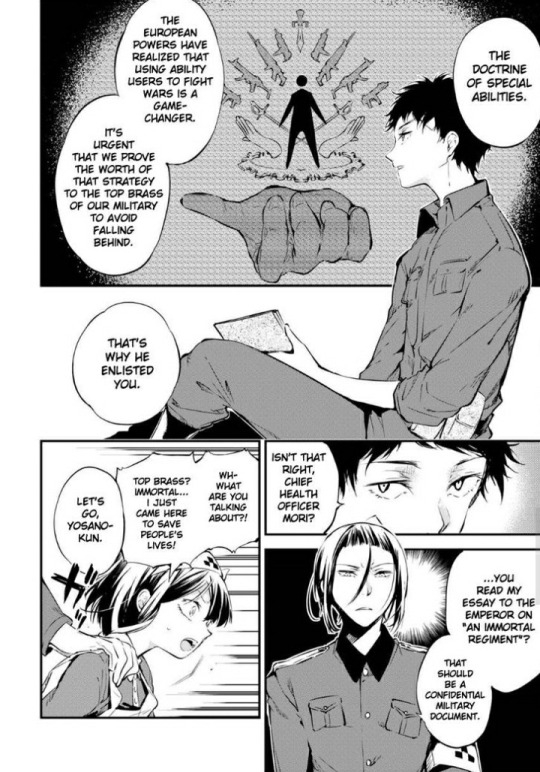
As much as her ability did save lives, it also forced soldiers to return to the frontlines and suffer injuries over and over again. The soldiers were never given the opportunity to return to their families because of her ability. This obliged them to carry on in the war without any excuse, inserting them into a vicious cycle they had no escape out of.
Metaphorically speaking, Yosano's hatred for Mori sort of mirrors Sho Ho's disdain for war and fighting, don't you think? The way Kafka materialised Yosano's past was quite interesting because he used chapters 65 and 66 to explain Yosano's dislike for Mori, reflecting how Sho Ho used her poem to explain why she condemned the idea of war and how her brother was part of it.
Before the effect of her ability was fully understood, however, every soldier praised and thanked her for what an angel she was. One of the soldiers she had befriended and gotten close to even kept a tally of the number of times she had saved him. He was the one who gifted her the butterfly hairpin she wore all the time.
The weight of the truth that her ability was a curse rather than a blessing fully dawned on her when her soldier friend ultimately committed suicide, because the fact of being indefinitely trapped in the throes of war agonised him until his spirit gave out. This drove Yosano to loathe her ability, or rather, how it was used.
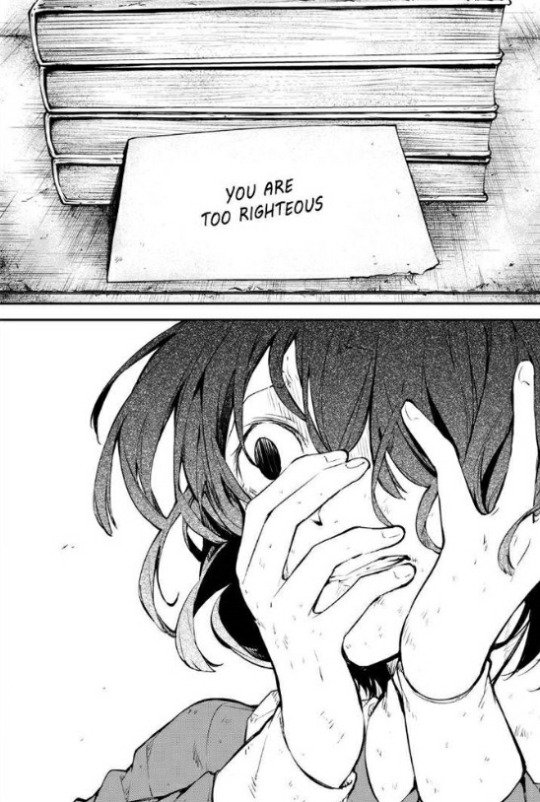
In the time she participated in the War, Yosano was given the alias 'angel of death' due to the control she retained over the battlefield, but I thought that perhaps Kafka had a reason behind giving her this title, so I did my research.
3. 'Angel of Death' defined.
Side note: I wouldn't want to disrespect any culture or religion, so if my citations are inaccurate and/or disrespectful, do feel free to correct me/let me know! I did research out of pure curiosity, and I don't intend to twist the significance of any of the interpretations.
I had to grow up learning about the basics of religious stuff, so it's kind of nice to study something out of the box, and very much against my father's rigid belief system :D
ARCHANGEL ARIEL
(archangel: an angel of higher rank)
I came across the few characteristics of angels/goddesses and their roles, and the one which really caught my attention was the female archangel, Ariel, the angel of nature.
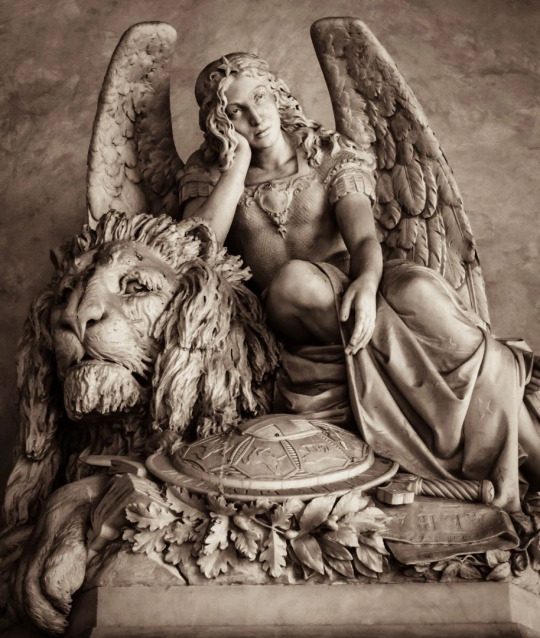
[ source ]
In Hebrew, the name Ariel means 'altar' or 'lioness of God,' and her role is to heal. In addition to that, she is also recognised as a helper to another one of the seven main archangels, Raphael, whose role is to provide physical and emotional healing, too.
She is the protecter of the environment and the animals therein, and is bestowed with the duty to oversee the order of heavenly bodies as well as earth's natural resources. She assures the sustenance of food, water, shelter, and supplies of human beings, much like how a nurse is to a patient I suppose.
In relation to Yosano, I think this part is pretty self-explanatory, or perhaps this is blown out of proportion HA, so take this as a suggestion rather than a fact, because I'd like to believe that Kafka had a reason for giving Yosano a title as such.
In the past, I've come across the angel of death only to perceive it as a female grim reaper of some sort, so it was pretty cool to find that the word 'angel' and 'death' made up a title of a someone like Ariel, one of the purest forms of humility and compassion.
GREEK GODDESS PANAKEIA
For my beloved (wannabe/or not) students of Greek mythology (much like myself, let's make a cult!), you've probably heard of Panakeia, the goddess of healing. Medicine finds most of its vital significance in Greek history, and in its mythology, Panakeia is actually known for her ability to heal any kind of sickness.
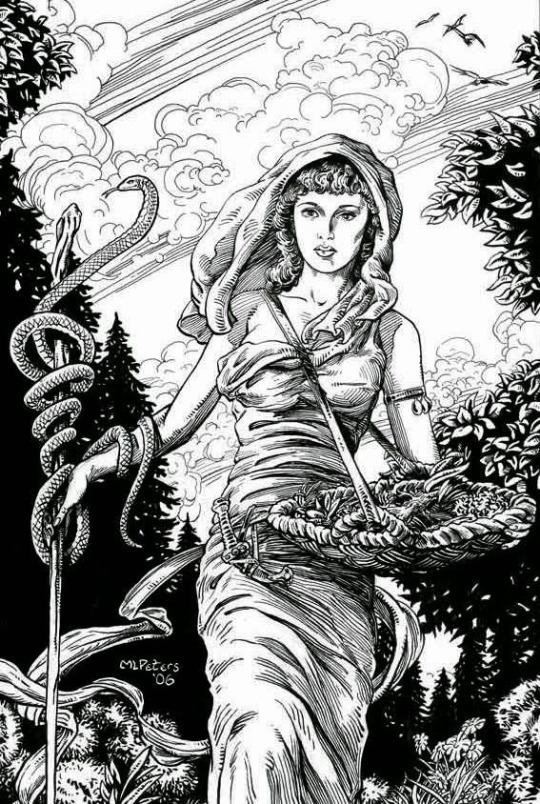
[ source ]
Her name means 'panacea,' which is actually defined as a remedy for all diseases. Terminal diseases and injuries lead to death, right? This would bring us back to Yosano's ability to nullify any injury's effects on a person, keeping them from death itself.
Now, we know that in order for Yosano's ability to work, her patient, or victim, has to be in a near-death condition in order for her treatment to take effect. This can't exactly fit into the description of resurrection, but it can be described as some sort of rebirth.
GREEK GODDESS PERSEPHONE
So another goddess which reminds me of Sho Ho/Yosano, is Persephone, the goddess of spring and rebirth. Before Hades, the god of the underworld, fell in love with Persephone to take her to live with him, Persephone lived a happy life.
Hades, with his nature of darkness and the like, was captivated by how pure Persephone was, and stole her away from her former life to live in an environment which differed sharply from her natural aura of purity.
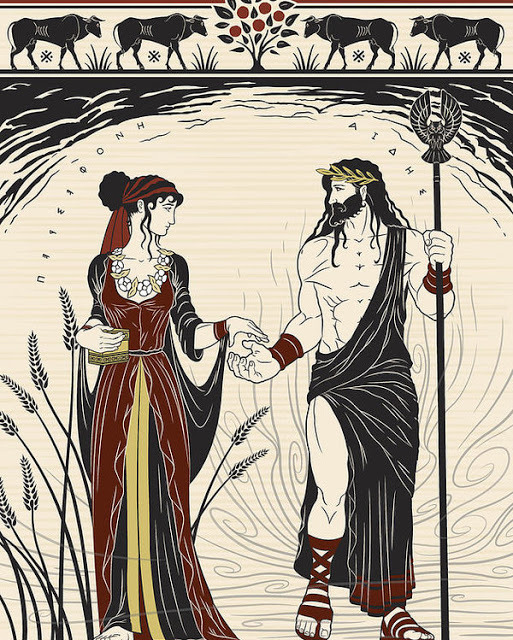
[ source ]
Remember when Yosano's friend left a note behind before he killed himself? The note said nothing except for, "You are too righteous." Take that as you will, but figuratively speaking, you could say Mori takes the role of Hades in the story, while Yosano can be portrayed as Persephone.
Sho Ho can also be a parallel of Persephone, in that she had to adapt to the realities of war and disharmony, while Persephone had to adapt to the raw darkness of the underworld with Hades.
Sho Ho stood against society's norms and decided to reform it, making her one of the most well-known feministic pacifist in history, while Persephone managed to escape from the underworld to return to her former position, earning the title the 'Bringer of Life,' or the 'Destroyer of Death.'
Furthermore, the way Sho Ho's anti-war poem took its effect later on, reflects the way Persephone restored balance in the world after returning from the underworld.
4. Yosano and Atsushi.
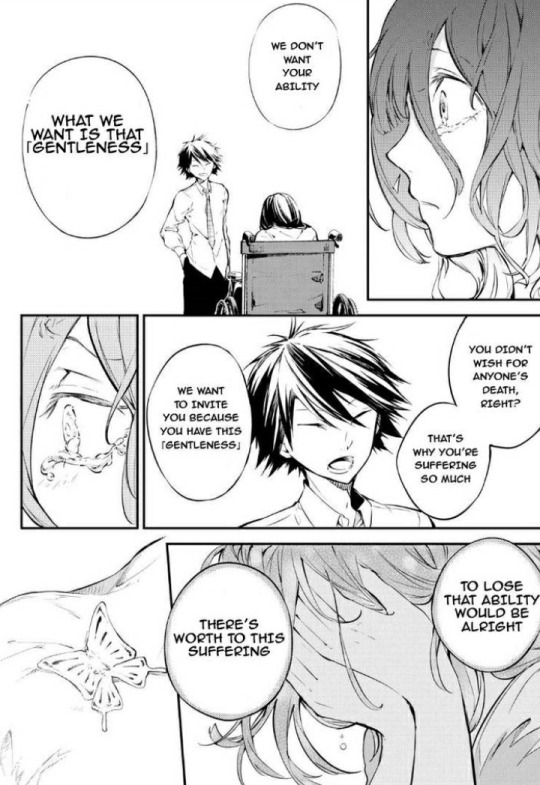
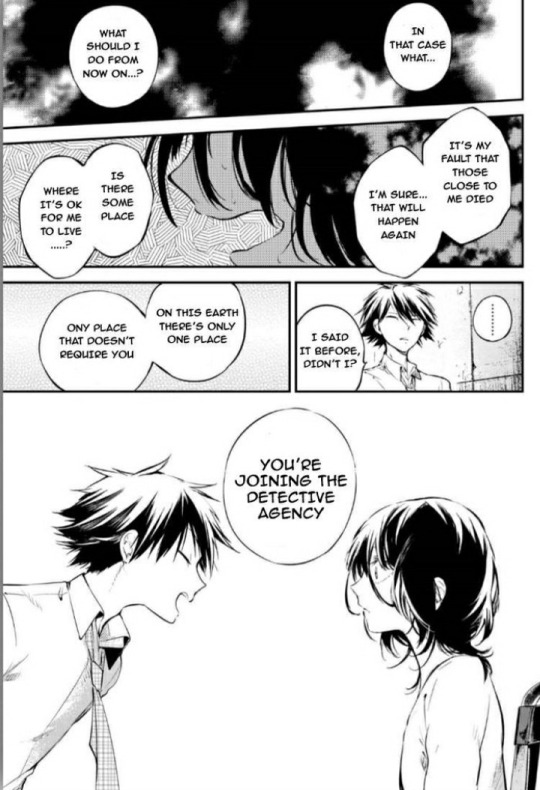
chapter 66; Yosano: "It's my fault that those close to me died... Is there some place where it's okay for me to live?"
chapter 8; Atsushi: "If I have any chance of saving them all, of returning them home safely, would that mean it's okay for me to keep on living?"
I couldn't help but think of Dazai and Atsushi back when I was reading through these panels. Ranpo (my beloved), along with Fukuzawa, accepted Yosano as she was, despite how her ability was a cause of despair and misfortune.
Ranpo looked past her mistakes and the entirety of how dark her past was to welcome her into the Armed Detective Agency. Dazai, on the other hand, knew who Atsushi was and what his ability had made him do before anyone else, and still decided to provide a safe place for Atsushi to find his sense of belonging, journeying with him as he learned to use his ability properly.
For more info about Dazai and Atsushi's dynamic, you can check out the analysis I did for Dazai :D
Atsushi desired to save people to prove his right to live, while Yosano made her wish to achieve the recovery of all her patients the reason for her existence.
Others would prefer to accuse both Yosano and Atsushi of having a saviour complex, but the reason why they pursued to save people with utmost dedication, stems from the nature of what their past was like. You know the saying 'from broken to beautiful?' Yeah, it's something like that.
The way their pasts were written out gave them a desire to change, which was, I daresay, initiated by the people who took them in: Ranpo and Dazai. Their abilities were demonised because of how they were used, but once they broke from their abilities' effect over their lives, they honed their skills to control them for the right cause instead.
In a less cynical point of view, I believe both Yosano and Atsushi stood for what was right, and wanted nothing but to achieve peace and harmony in whatever way they could, even if it meant risking their own lives to save others.
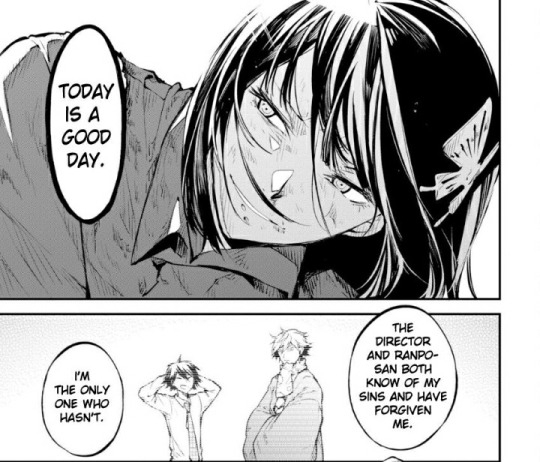
So yeah, that's it for my rants today. Thank you for reading, and if you have anything to add, go ahead! I'm open to discussions ;)
#bsd#bsd atsushi#bsd yosano#bungou stray dogs#bungo stray dogs#bsd characters#bsd analysis#literature analysis#bsd abilities#bsd anime#bsd manga#bungo stray dogs atsushi#bungou stray dogs atsushi#bungou stray dogs yosano#bsd dazai#bsd mori#bsd ranpo#character analysis#.daydreams
178 notes
·
View notes
Text
Reconnecting with the Divine Feminine

I don’t think it’s groundbreaking or controversial at this point to say that all three Abrahamic religions are mostly patriarchal. Sure, we can talk about the veneration of the Virgin Mary, or the woman prophets in the Tanakh, or women saints in Islam. At the end of the day, though, we cannot overlook the fact that in Christianity, Judaism, and Islam, God is a man. Since 31% of the world’s population identify as Christian and 23% identify as Muslim, that means over half of the people on Earth are completely disconnected from the feminine side of divinity.
Ironically Judaism, Christianity, and Islam are among very few religions that don’t embrace a feminine aspect of divinity. Patriarchal religion is treated like the norm in most modern cultures (again, largely because of the dominance of Christianity and Islam), but it has definitely not been the norm throughout human history. The Goddess, the Divine Feminine, has been a prominent part of human spirituality since before recorded history.
In ancient Sumer she was Inanna, the Queen of Heaven. In Egypt she was Isis, Lady of the Sky, Great of Magic, and Hathor, Lady of the West, and Sekhmet, Mistress of Fear. In Hinduism she is Shakti, the feminine principle that moves the universe. In Japan she is Amaterasu, the Great Illuminating Deity, and Izanami, the creatrix who rules the underworld. The Divine Feminine has taken all of these forms at different times and places, among many, many others.
Even the Abrahamic religions haven’t always been solely focused on masculine divinity. There is significant evidence that the Abrahamic God was originally part of a larger pantheon before becoming the sole object of worship in Israel and Judah. As part of a polytheist system, he had a consort, a goddess named Asherah. Rabbinic literature refers to the divine presence of the Jewish God as “shekinah” — interestingly, this is a feminine word, implying that this aspect of God is feminine.
The removal of feminine divinity from Christianity largely occurred during the fourth century, when Roman Christianity beat out other traditions as the sole “correct” Church. Before this some Christian groups, notably those in North Africa, had worshiped God as both Father and Mother — a masculine/feminine dyad, rather than the masculine trinity worshiped in Rome. Other groups identified the Holy Spirit as feminine, creating a trinity of Father, Mother, and Son. (Interestingly, these family triads were also common in Egyptian paganism.) When the Nicene Creed was created in 325 to standardize Christian belief and practice, it excluded these interpretations by affirming belief only in “God, the Father Almighty” and “Jesus Christ, the Son of God” and removing all mentions of God the Mother.
All of this does not invalidate the genuine, life-changing spiritual experiences people have had with modern Judaism, Christianity, or Islam. It does, however, prove that patriarchal religion is the exception, not the rule.
Modern paganism’s acceptance and veneration of the Divine Feminine is a large part of its appeal for many converts, especially women, genderfluid, and nonbinary people who do not see themselves represented in the mythology and art of patriarchal religion. The Divine Feminine is present in all pagan religions, though She takes different forms in different faiths.
In monist pagan paths like Wicca, the polarity of Goddess and God is seen as one of the primary ways deity makes itself known to mankind. In the words of Scott Cunningham, one of Wicca’s most influential authors, “The Goddess and God are equal; neither is higher or more deserving of respect… The Goddess is the universal mother. She is the source of fertility, endless wisdom, and loving caresses… She is at once the unploughed field, the full harvest, and the dormant, frost-covered earth.”
The Goddess and the God balance and compliment each other, and this balance is at the core of many neopagan religions. (There are some traditions that exclusively worship the Goddess, but we’ll talk more about that in a future post.)
In polytheist paganism, the Divine Feminine is present in the form of various goddesses who rule over different aspects of life and nature. It is not uncommon for polytheist pagans (or monist pagans, for that matter) to work with multiple goddesses, even goddesses from different historical pantheons. Some goddesses are explicitly associated with certain aspects of womanhood — for example, the Greek goddess Artemis is associated with virgins and young girls, while Demeter is associated with motherhood.
In many (but not all) polytheist systems, there is an emphasis on balance between gods and goddesses. One of my favorite examples of this is the marriage of the Morrigan and the Dagda in Irish mythology. The Morrigan, goddess of war, magic, and death, is married to the “good god” of life, fertility, and knowledge. Their union represents a balance between opposite, complimentary forces.
This brings us to another point I want to make, while we’re on the subject of the Divine Feminine: not all feminine divinities are passive, maternal, fertility goddesses.
In Western culture, women (and, by extension, feminine deities) are seen as the passive or receptive sex. This is largely a product of Victorian England, not an ancient truth.
Without knowledge of sex chromosomes, hormones, or the complexities of gender, Victorian thinkers developed a theory that men had a “katabolic” nature that was constantly releasing energy, while women had an “anabolic” nature that was constantly receiving and storing up energy. This concept of gender greatly influenced Western occultism and can be seen, for example, in Gerald Gardener’s conception of the Goddess as the passive recipient of the God’s energy.
This is a relatively new and very Western idea. In Hinduism, for example, Shakti is both the feminine principle and the energy that moves the cosmos. In the words of author Kavitha Chinnaiyan, “there is nothing in creation that isn’t a manifestation of Shakti.” Shiva, the masculine principle, is unchanging awareness — it is Shakti who possesses the dynamic energy necessary for creation.
I am by no means encouraging pagans to appropriate Hindu concepts. My point here is that no gender is entirely active or entirely passive, which is why so many cultures interpret gender in so many different ways.
Even within systems like traditional Wicca, which operate within a strict gender binary, neither gender can be completely tied down. In their book A Witches’ Bible, traditional Wiccans Janet and Stewart Farrar acknowledge that the “masculine = active, feminine = passive” model is an oversimplification. They use the example of an artist and muse. The (feminine) muse “fertilizes” the (masculine) artist, who “gives birth” to the resulting art.
Personally, I see the masculine/feminine polarity as a constantly shifting dynamic, with both sides giving and receiving energy all the time. Which side of the polarity is more active or passive depends on the situation.
Being pagan does not mean dedicating yourself to the worship of gender binaries, and it does not mean you need to uphold those binaries. God and Goddess are only two of many possible expressions of the Divine, just like man and woman are only two of many possible gender expressions.
Monist pagans see the God and Goddess as two halves of a greater, all-gendered whole. Polytheist pagans may worship gods and goddesses who fall outside of the gender binary such as the Norse Loki or the Egyptian Atum. In either case, divinity is seen as encompassing all possible gender expressions, not just cis man and cis woman.
The erasure of the feminine from Western religion and mythology means that the nonbinary nature of some deities is often downplayed or erased completely. (You’d be hard pressed to find a mythology book that doesn’t use he/him pronouns for both Loki and Atum.) Reconnecting with the Divine Feminine opens the door for other divine expressions of gender.
The end result of this acceptance of feminine and nonbinary divinity is a religious community built on equality between all gender expressions. No one is closer to the gods because of the anatomy they were born with or the gender they present as.
This paves the way for a religion where no one’s worship is restricted because of their gender expression. It allows for priests, priestesses, and priestixes. It allows everyone to fully participate in the rites of their faith, on equal footing regardless of gender or pronouns. It also creates an environment where practitioners feel comfortable exploring issues of gender and sexuality, knowing that they will not lose the support of their community if their identity changes.
Resources:
The Gnostic Gospels by Elaine Pagels
Wicca: A Guide for the Solitary Practitioner by Scott Cunningham
The Morrigan and The Dagda by Morgan Daimler
“Victorian Theories of Sex and Sexuality” by Elizabeth Lee, Brown University
Shakti Rising by Kavitha M. Chinnaiyan, M.D.
A Witches’ Bible by Janet and Stewart Farrar
Casting a Queer Circle: Non-binary Witchcraft by Thista Minai
#paganism 101#pagan#paganism#goddess#divine feminine#wicca#wiccan#feri#reclaiming#celtic paganism#irish paganism#hellenic polytheism#hellenic paganism#hellenismos#religio romana#roman paganism#heathenry#norse paganism#norse polytheism#kemetic polytheism#kemetic paganism#eclectic pagan#witchblr#witch#witchy#baby witch#christian witch#long post#my writing#mine
239 notes
·
View notes